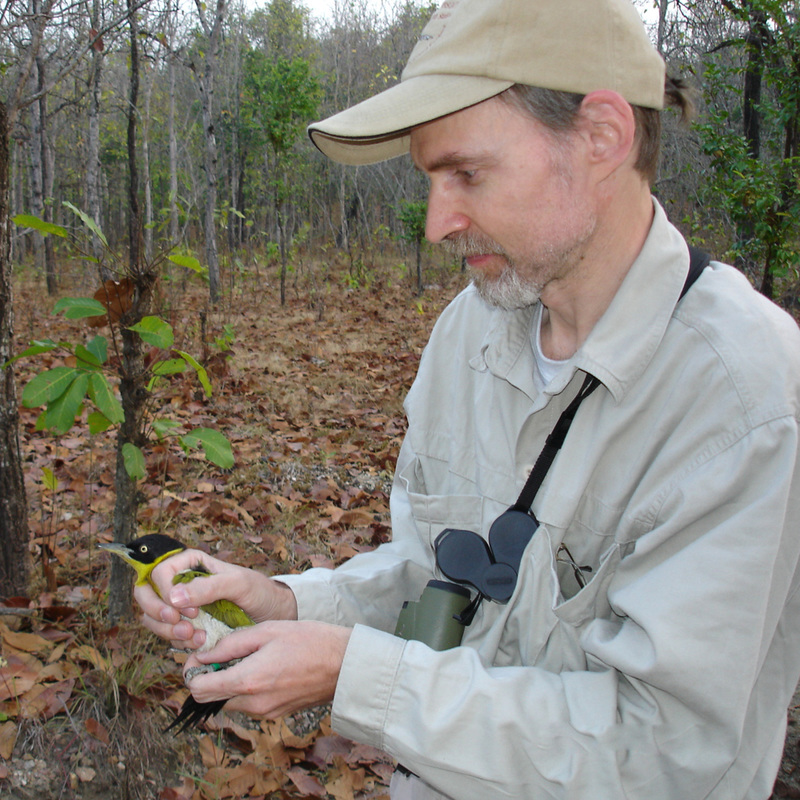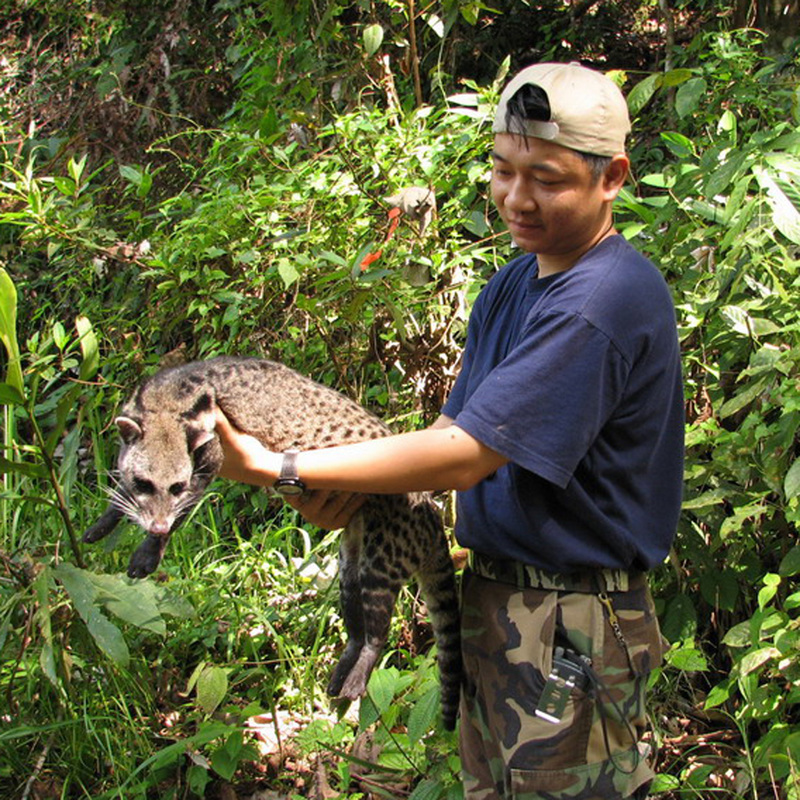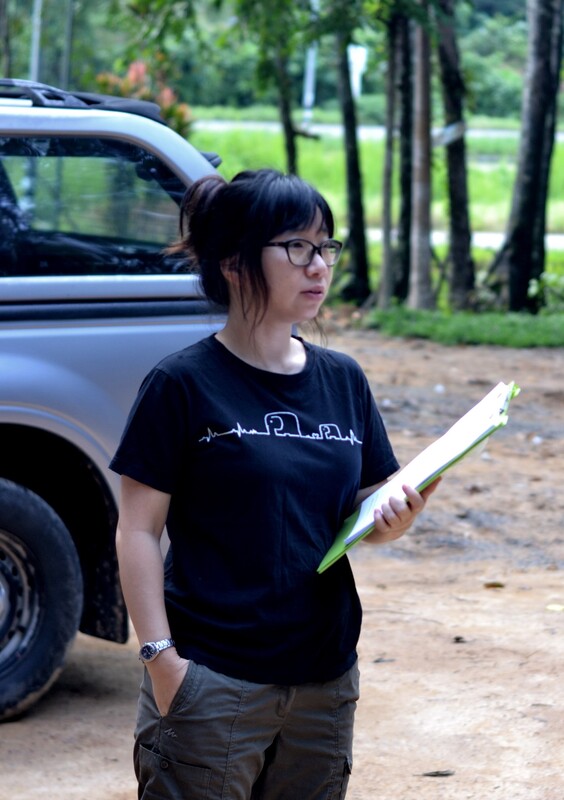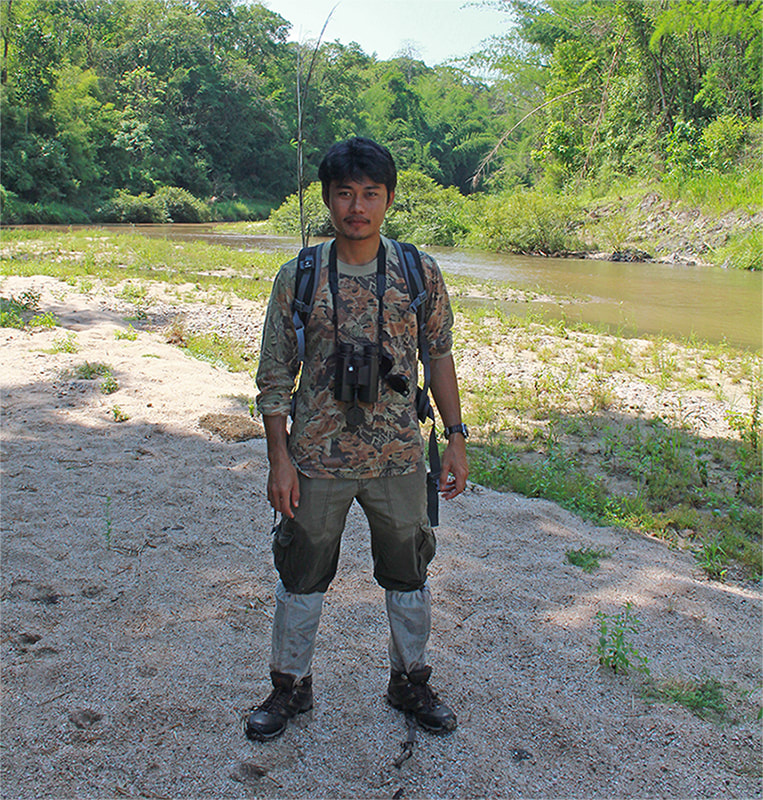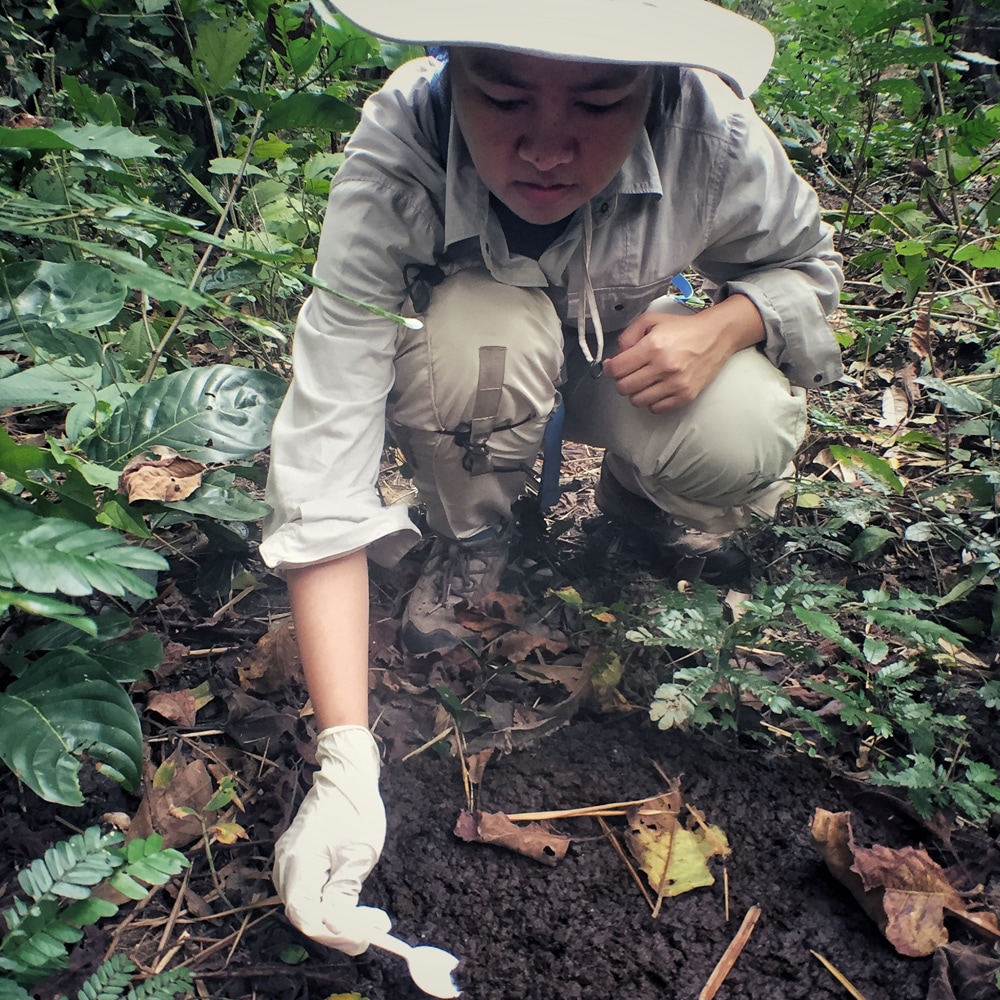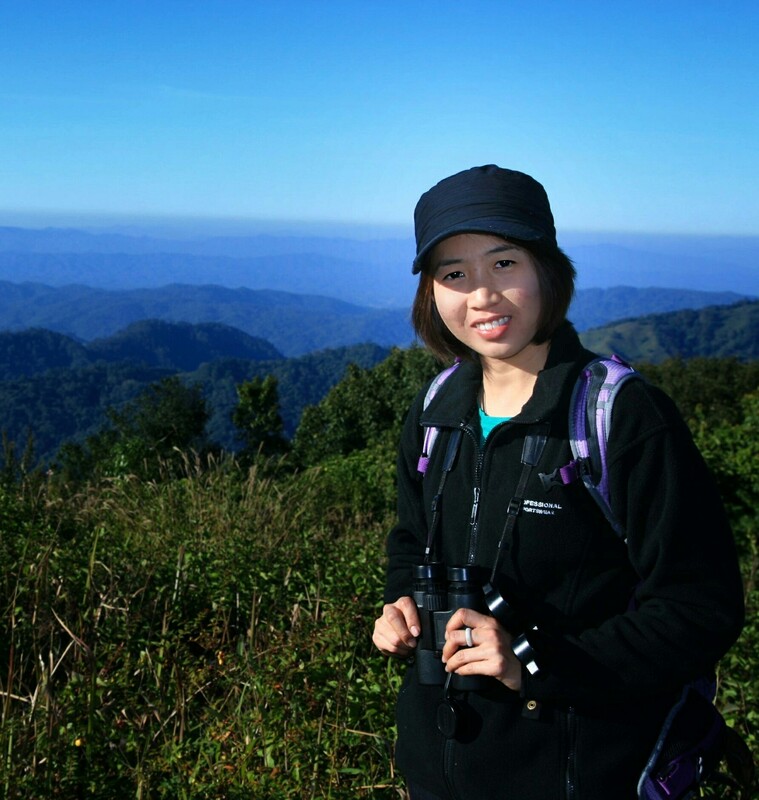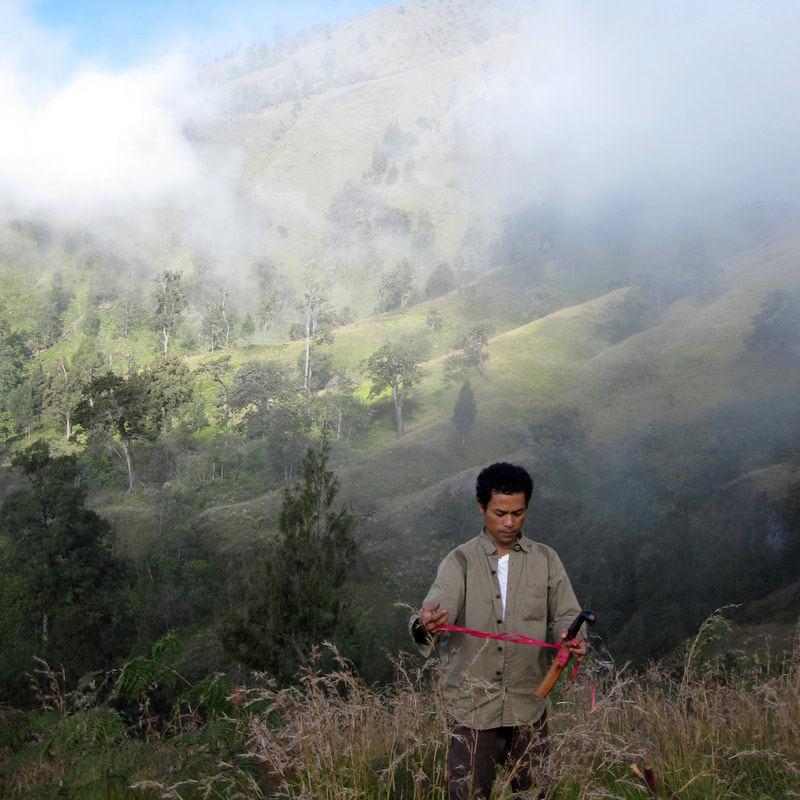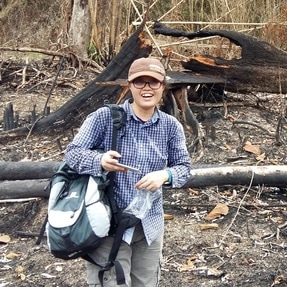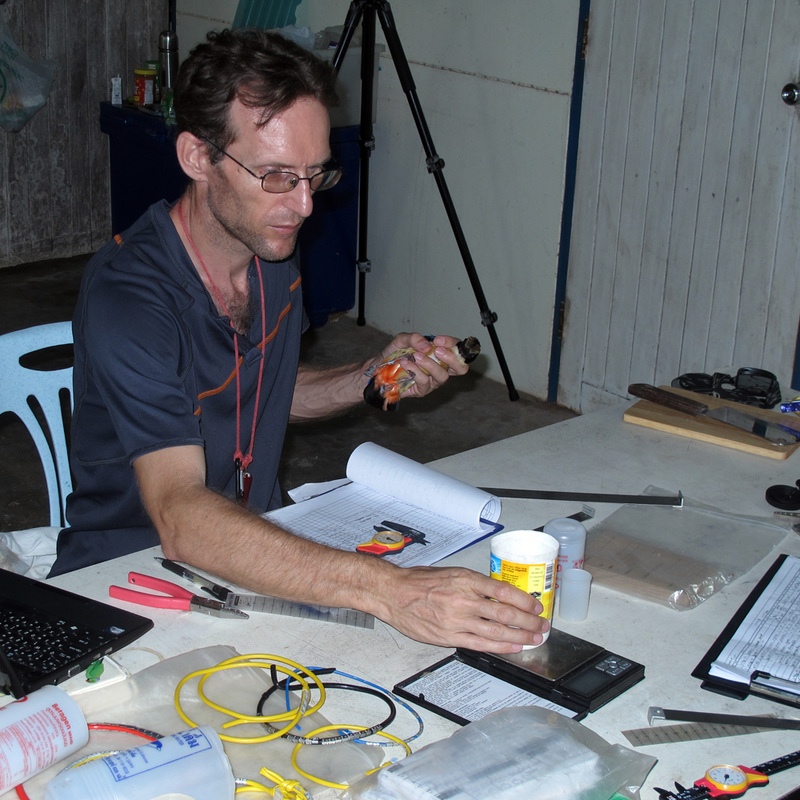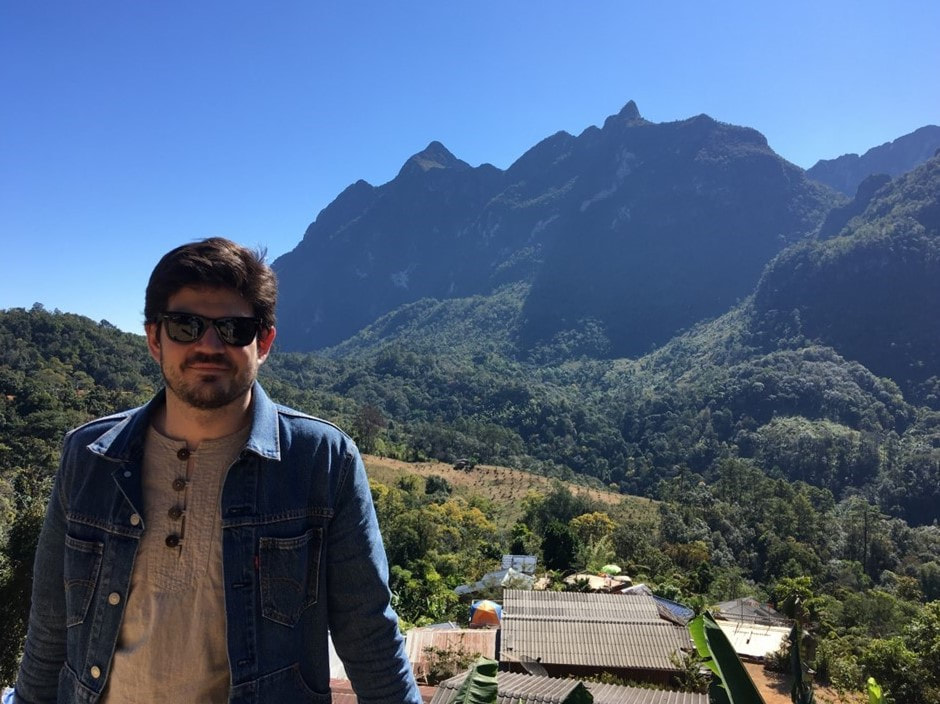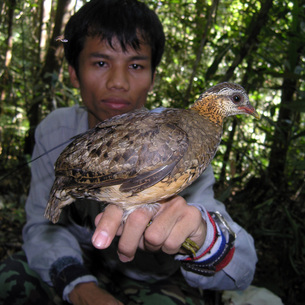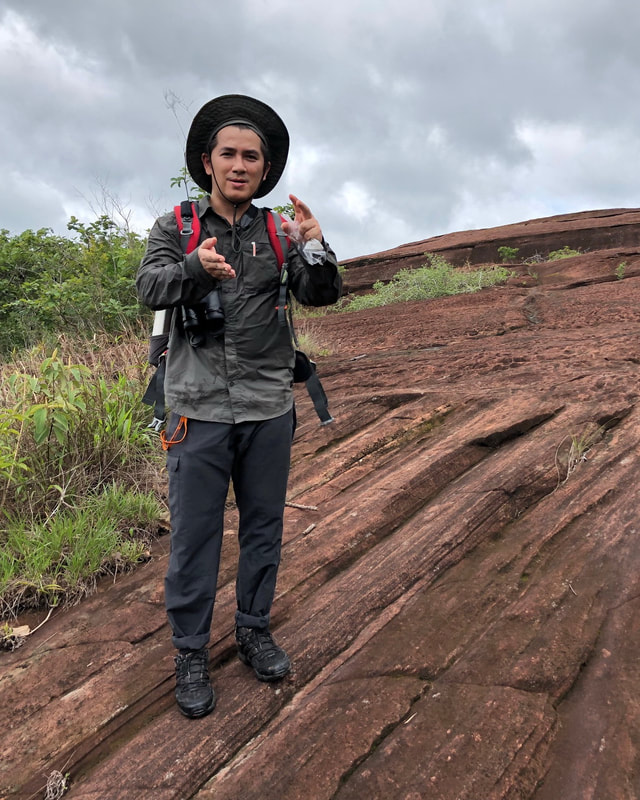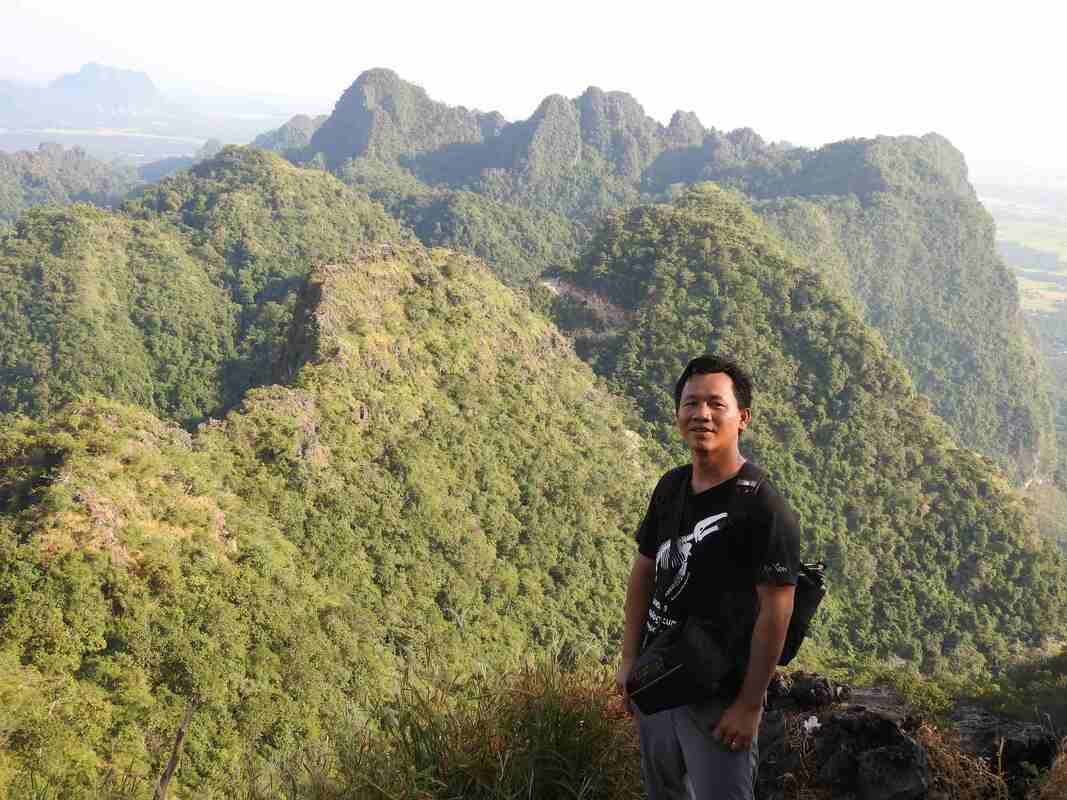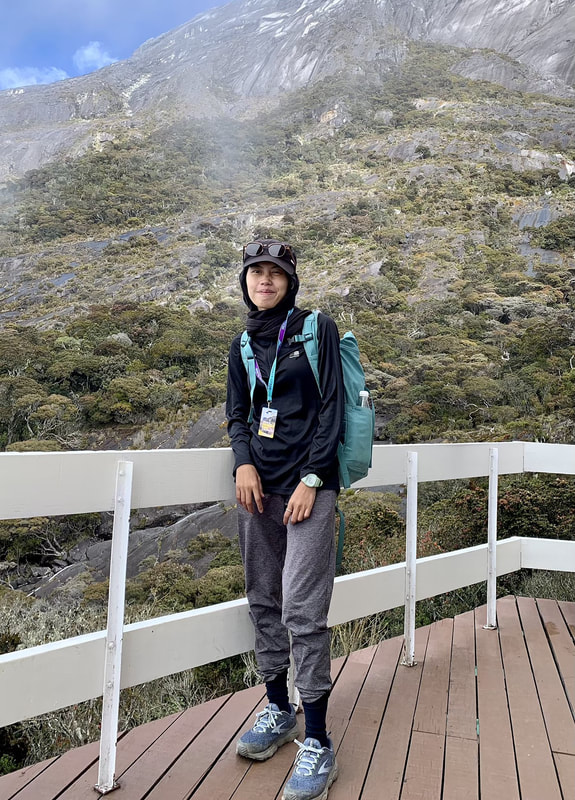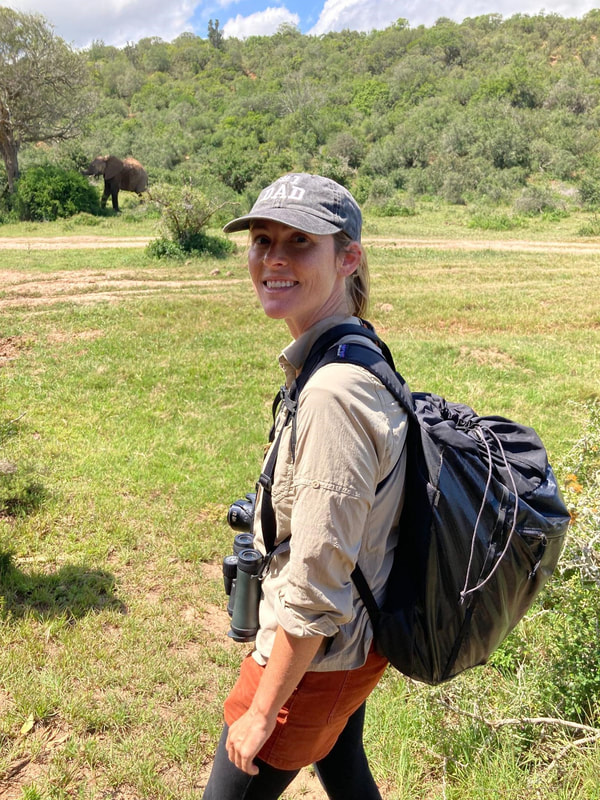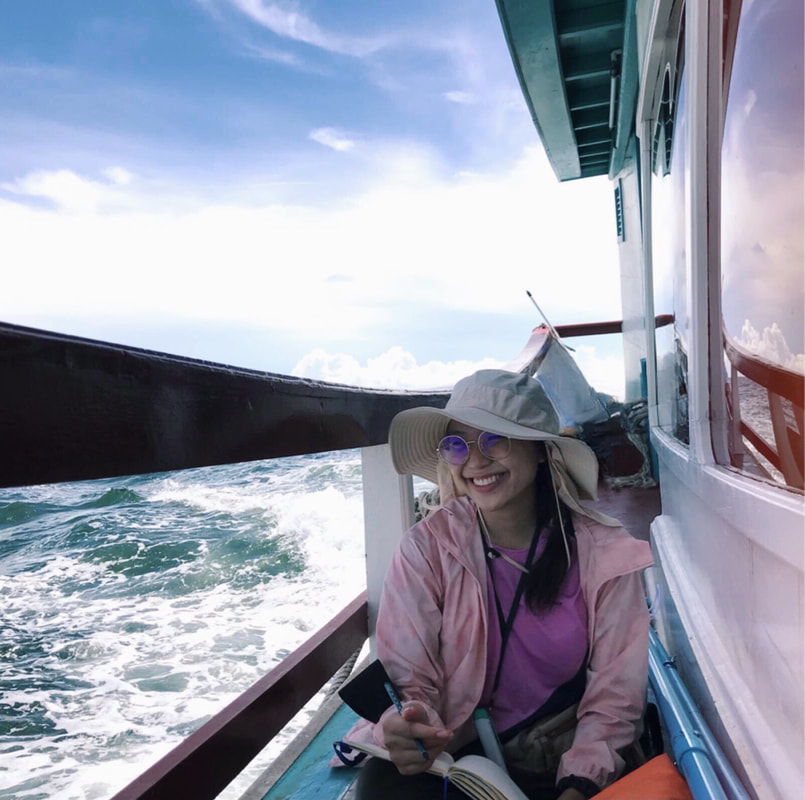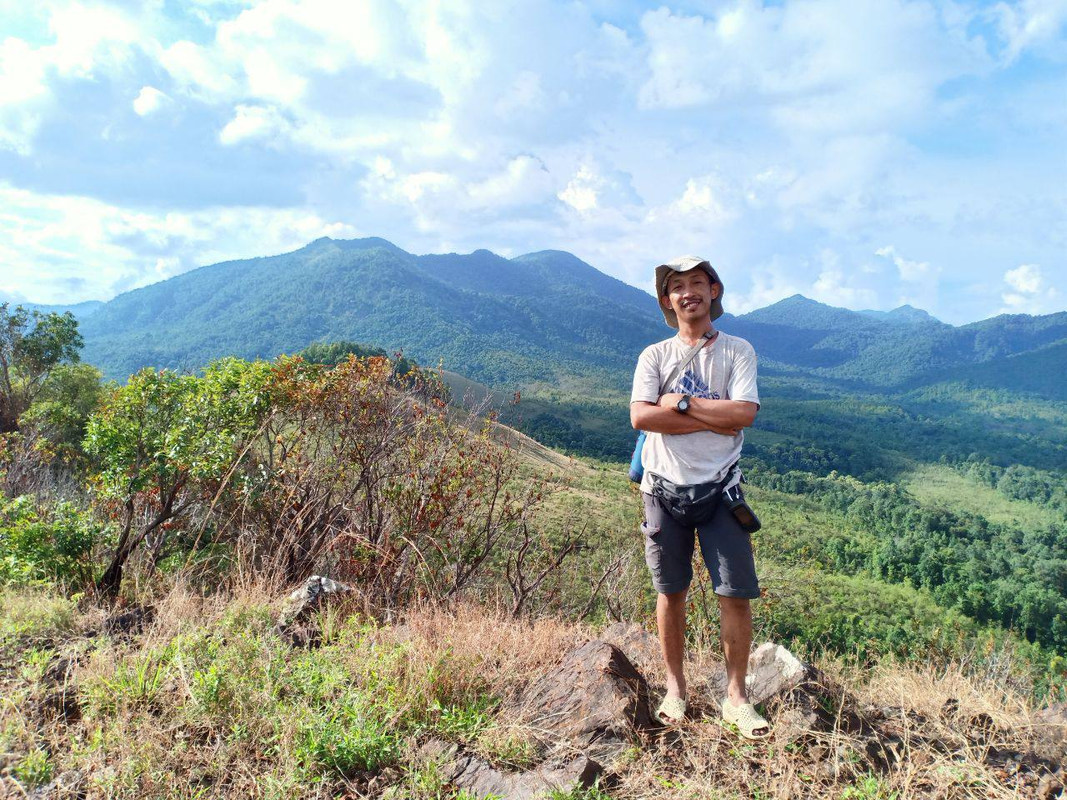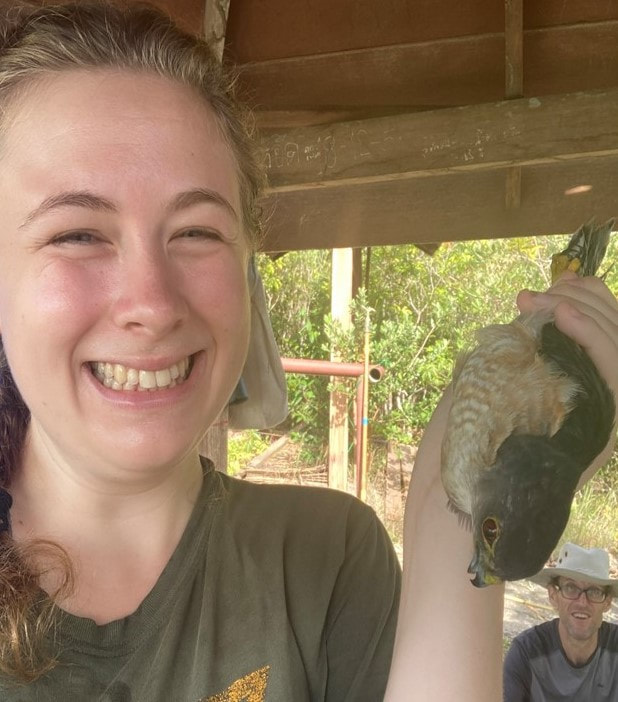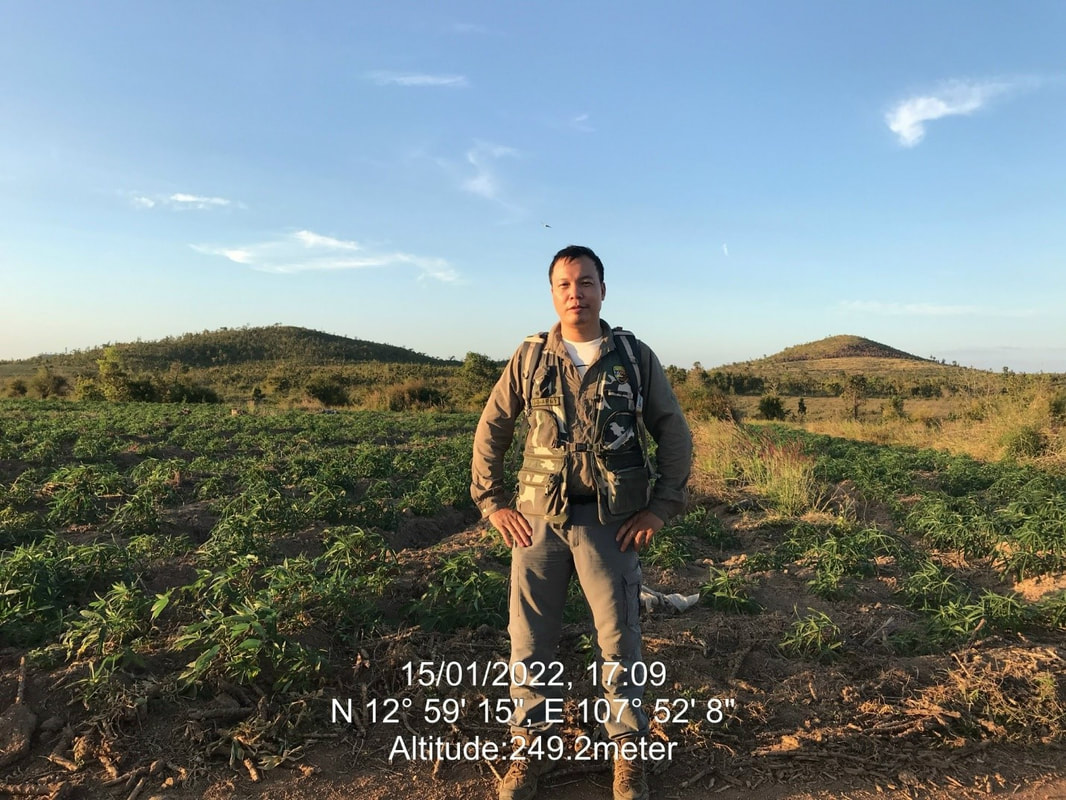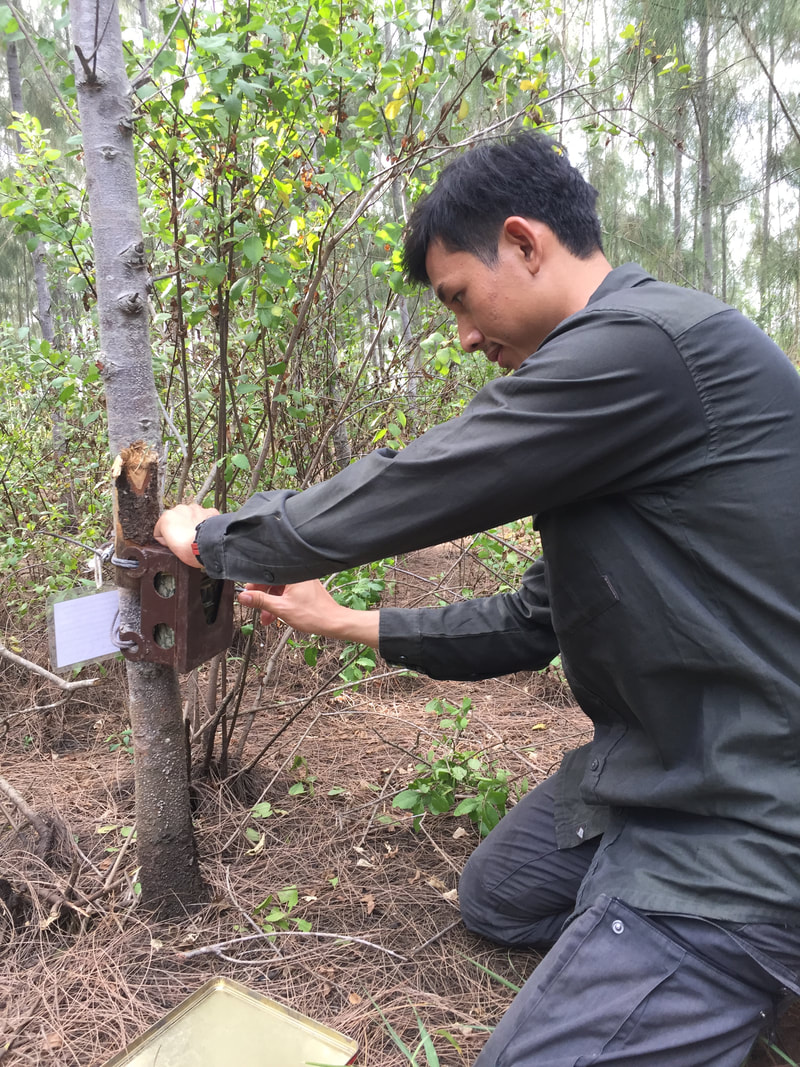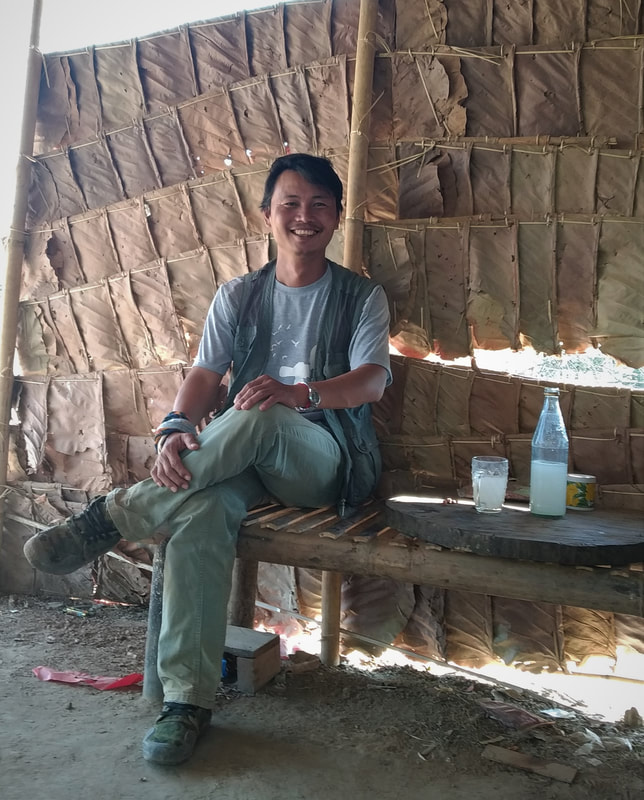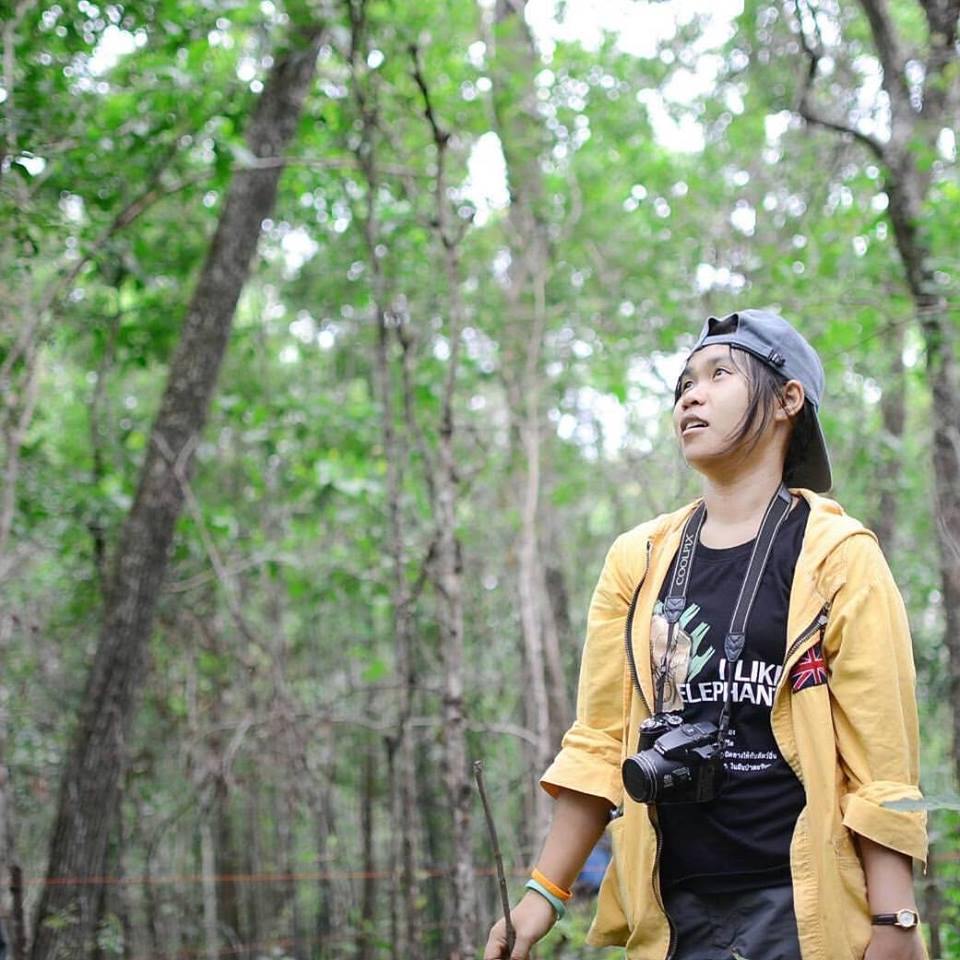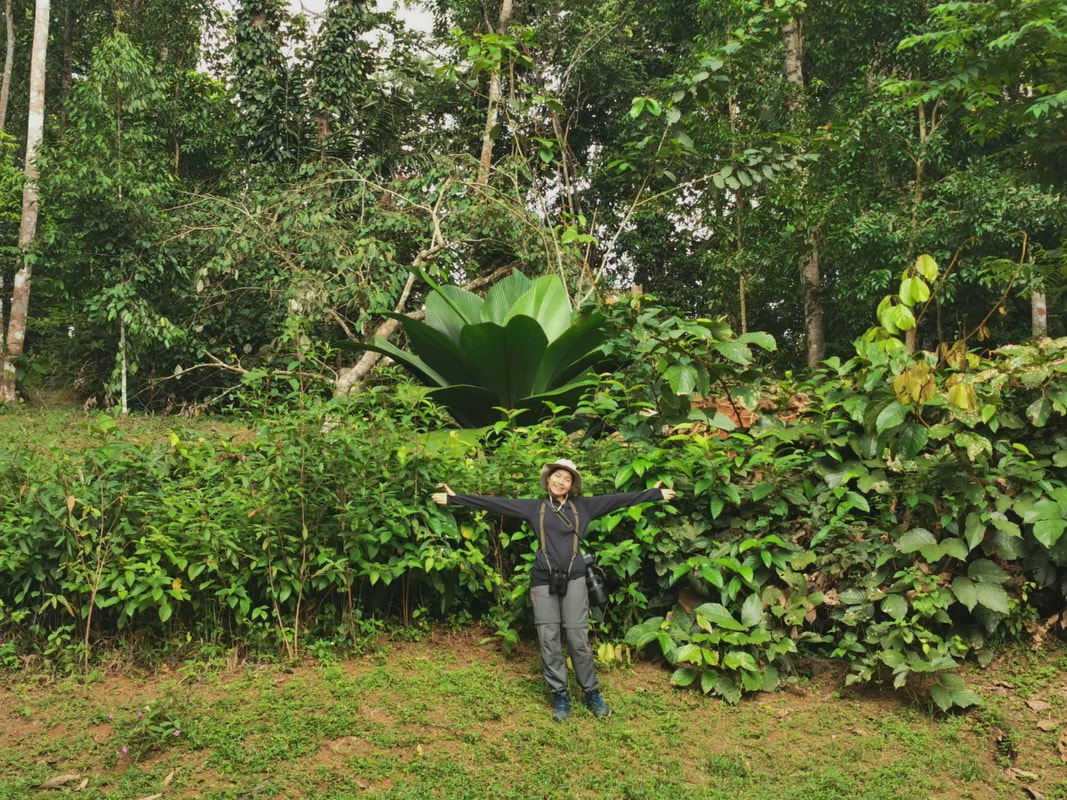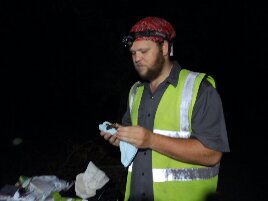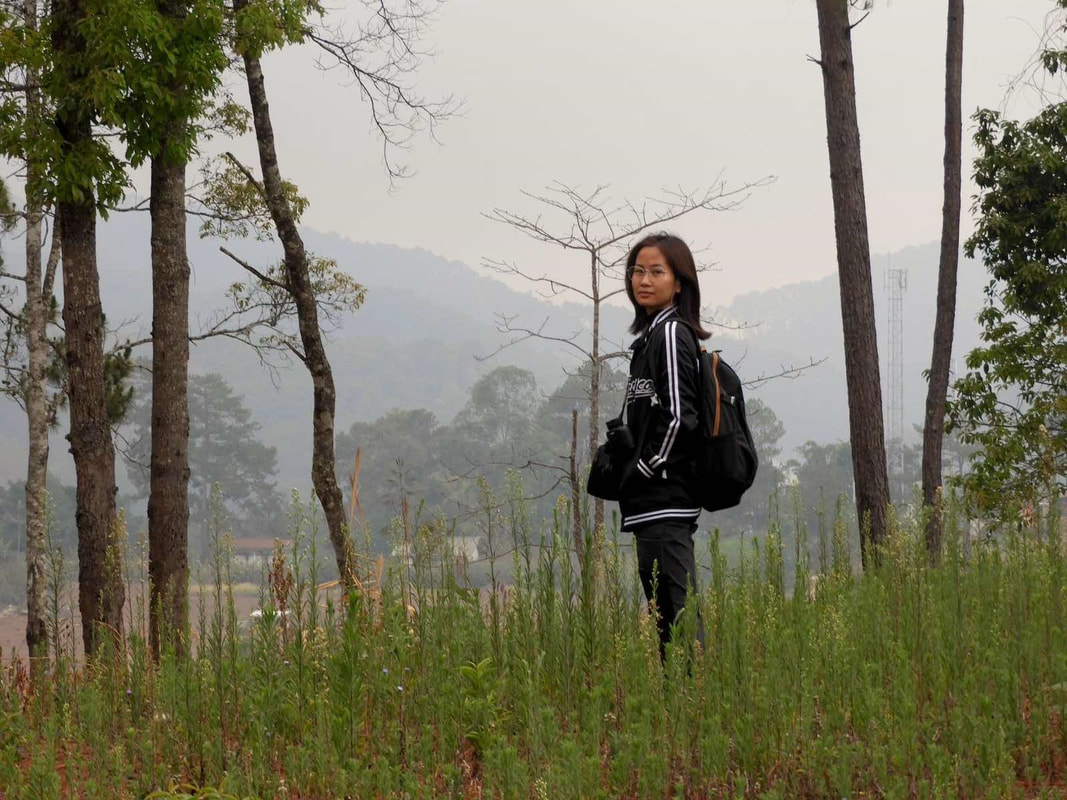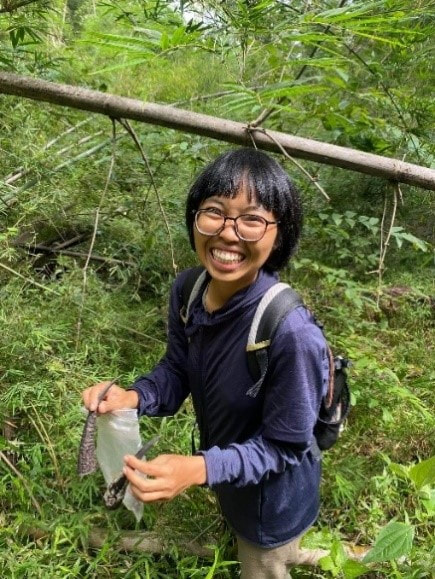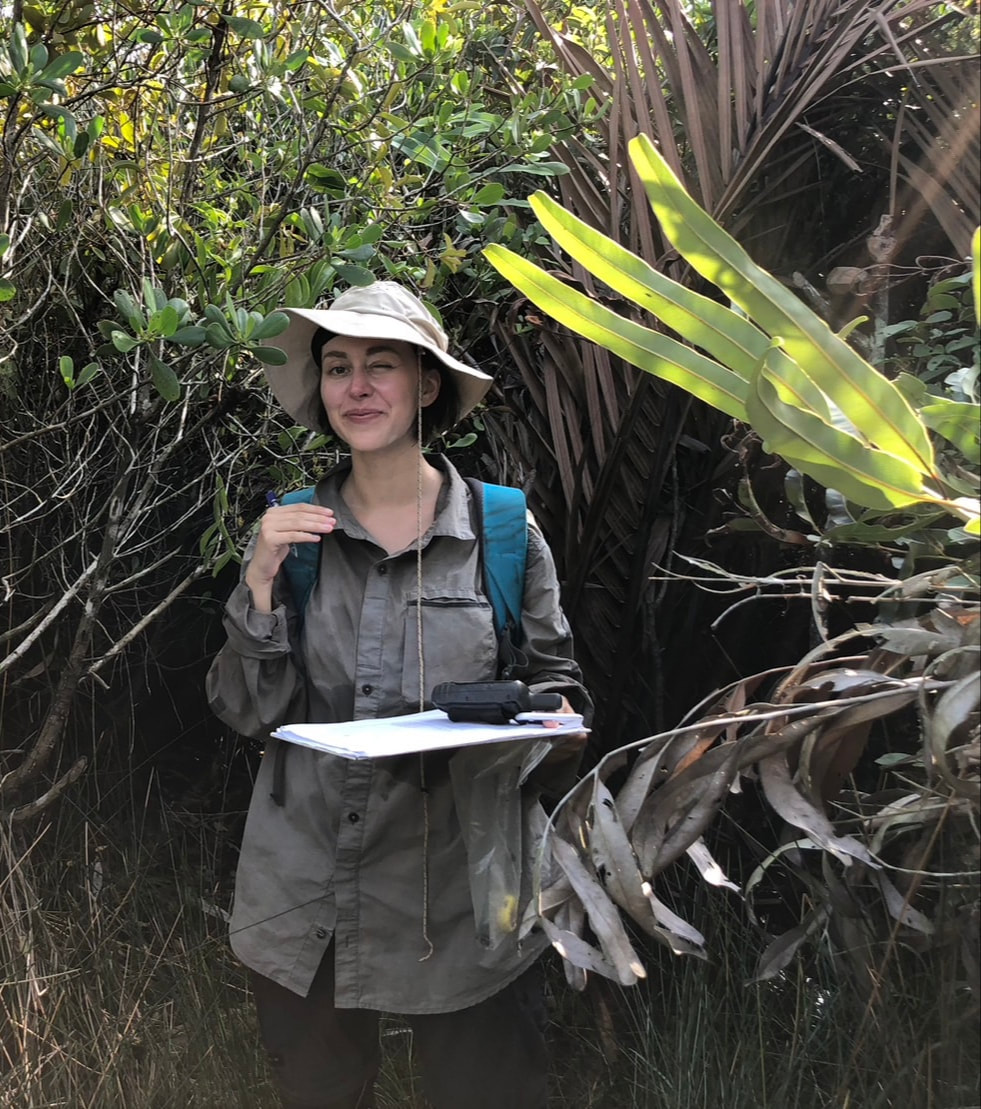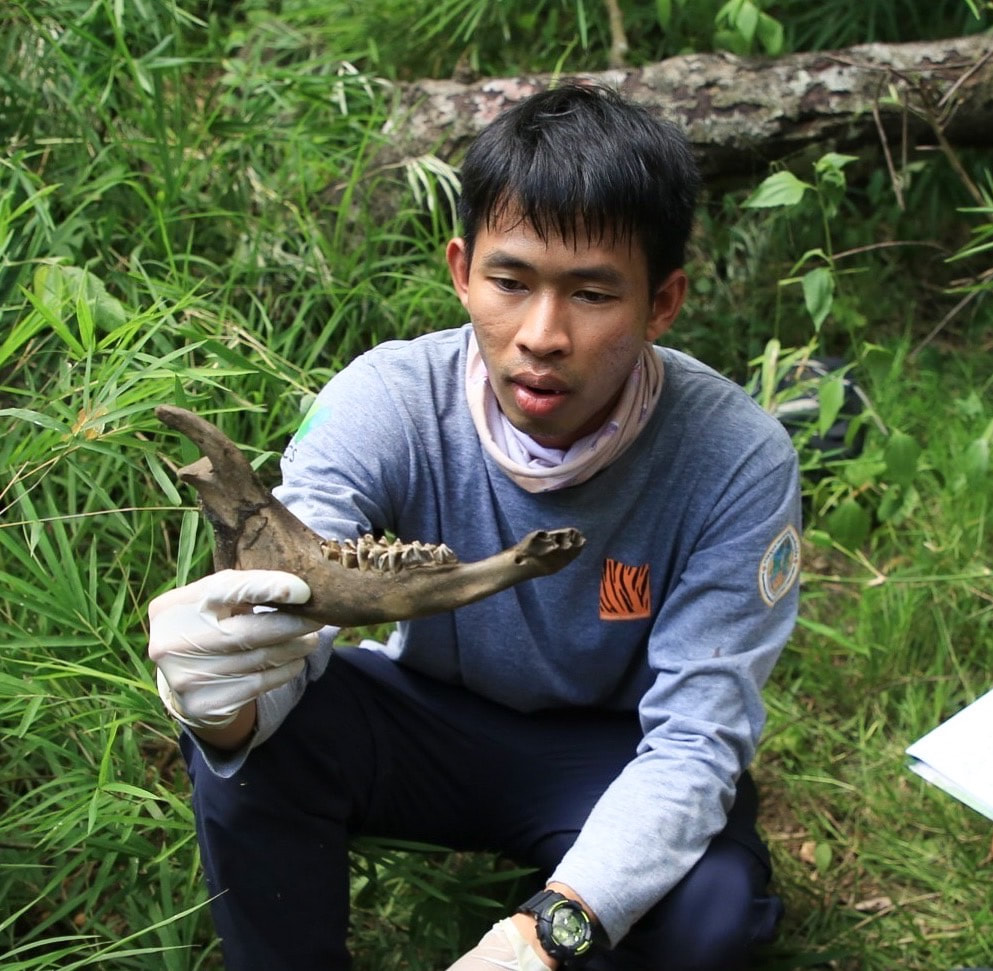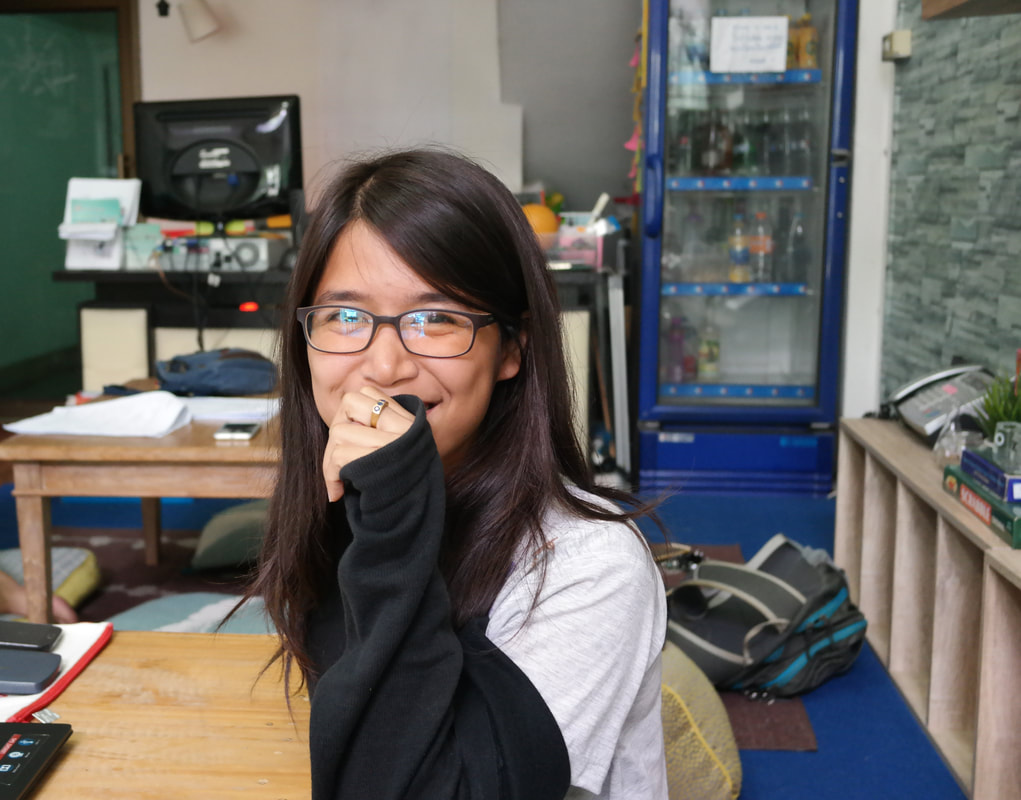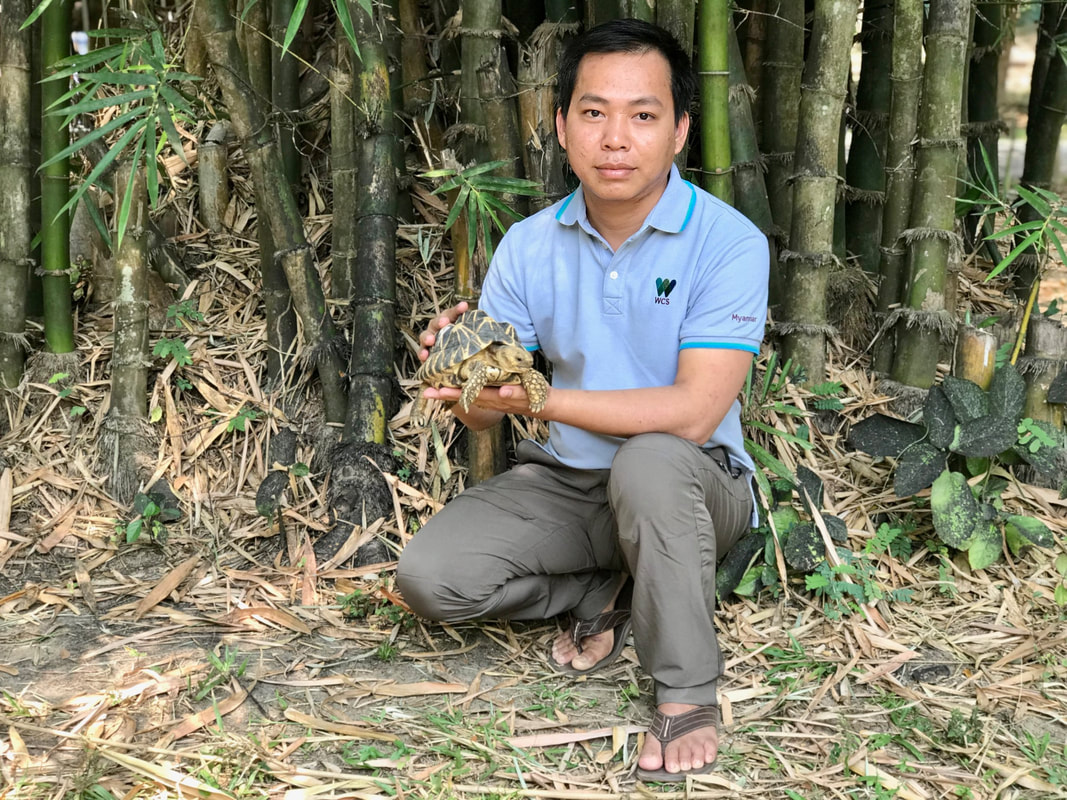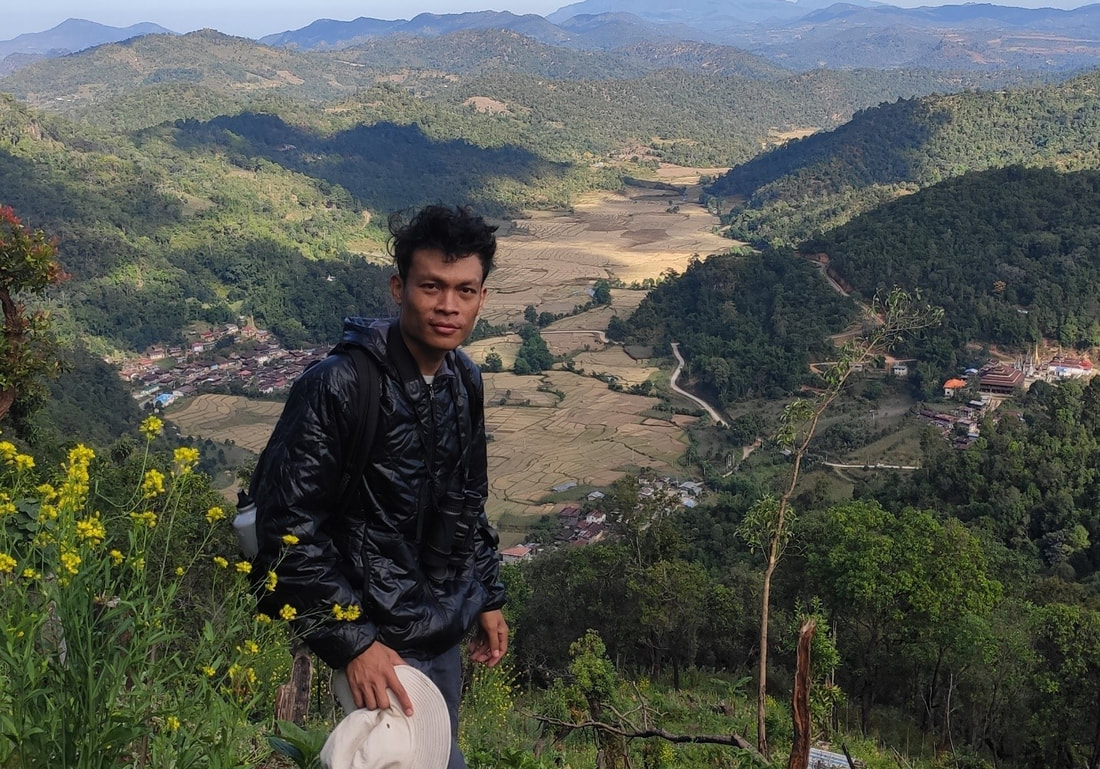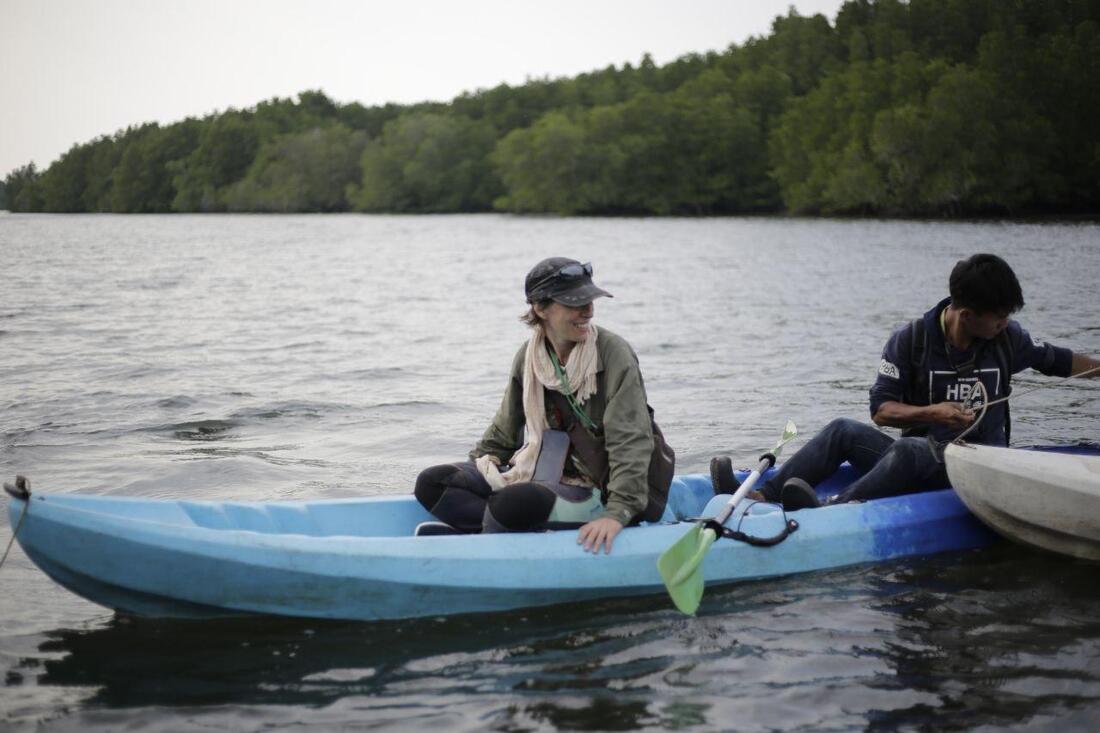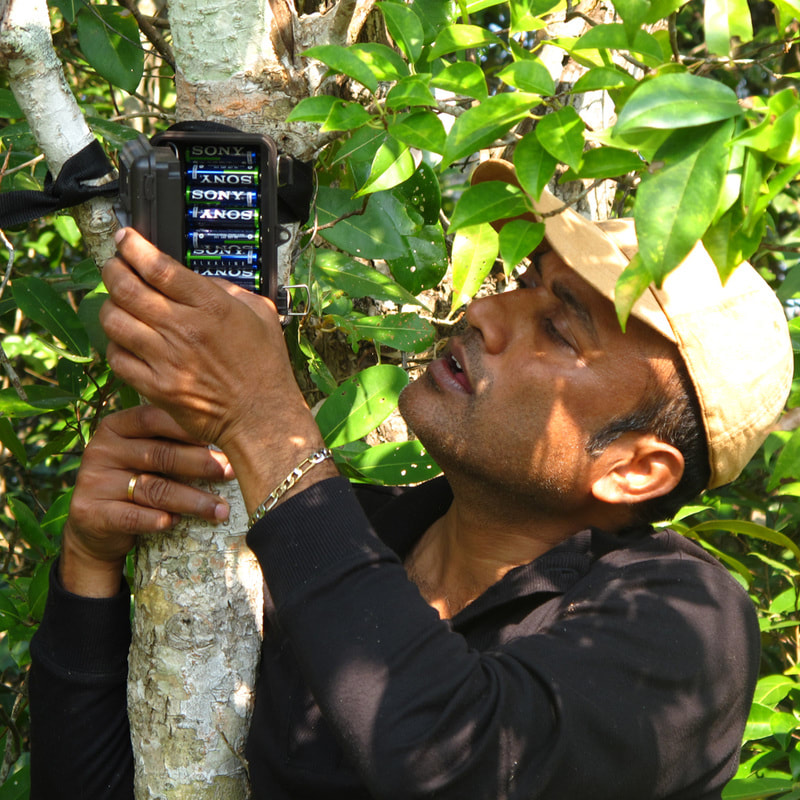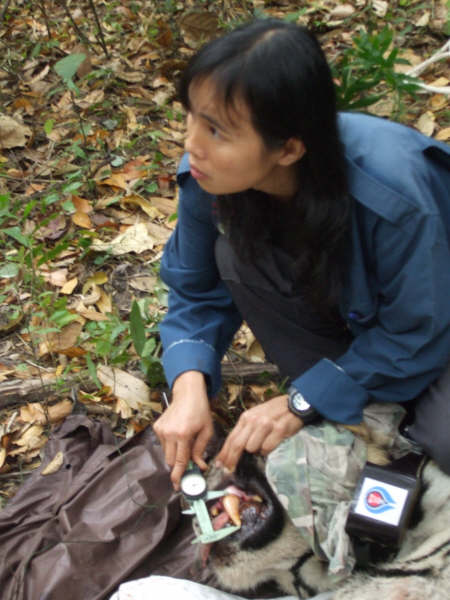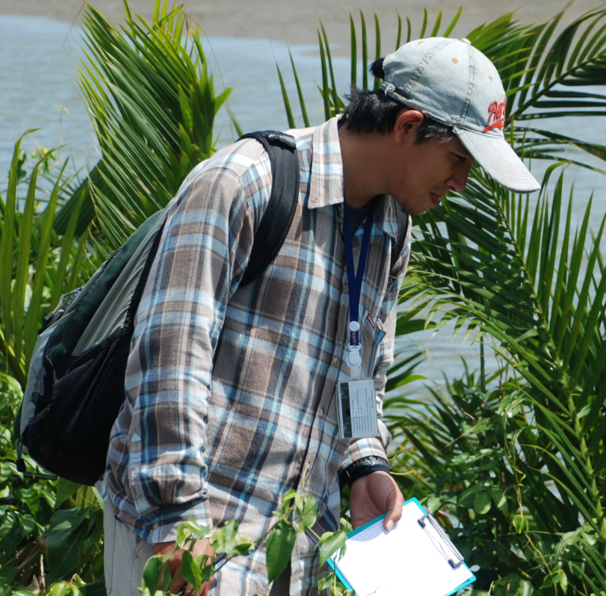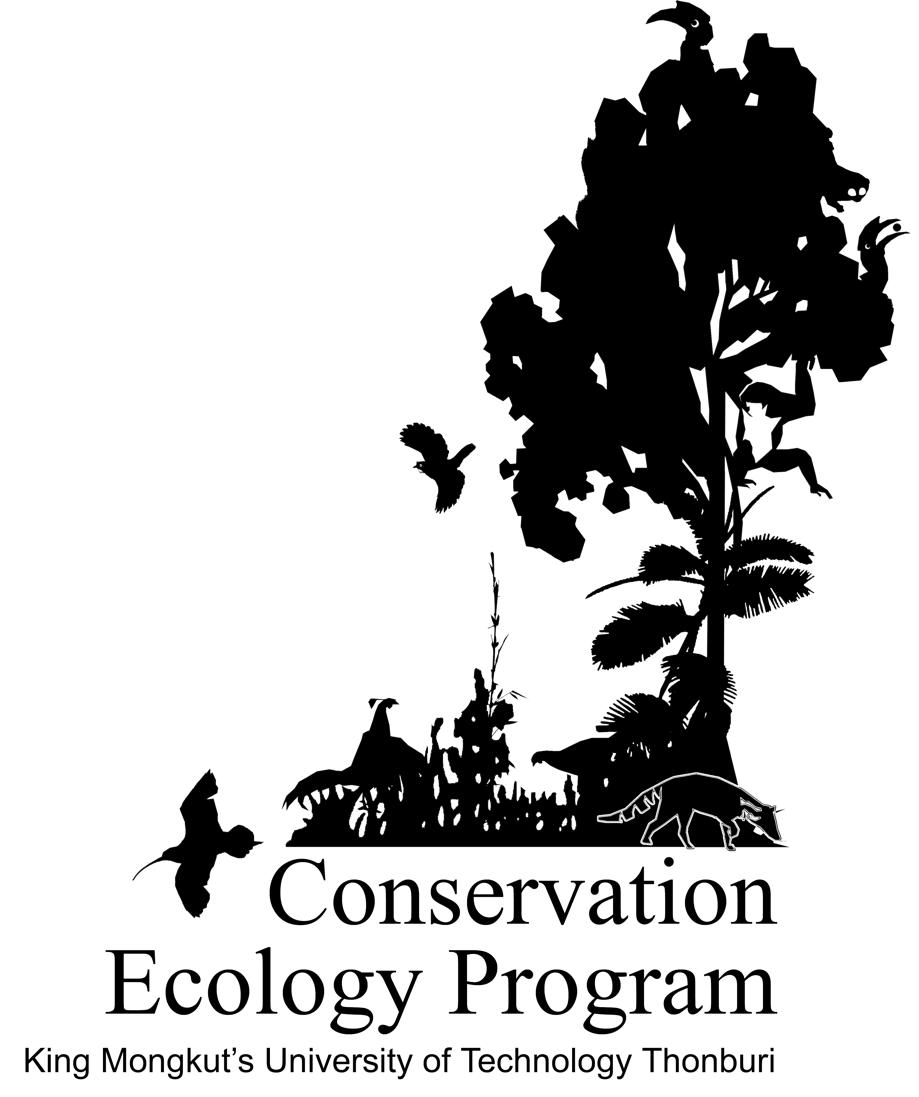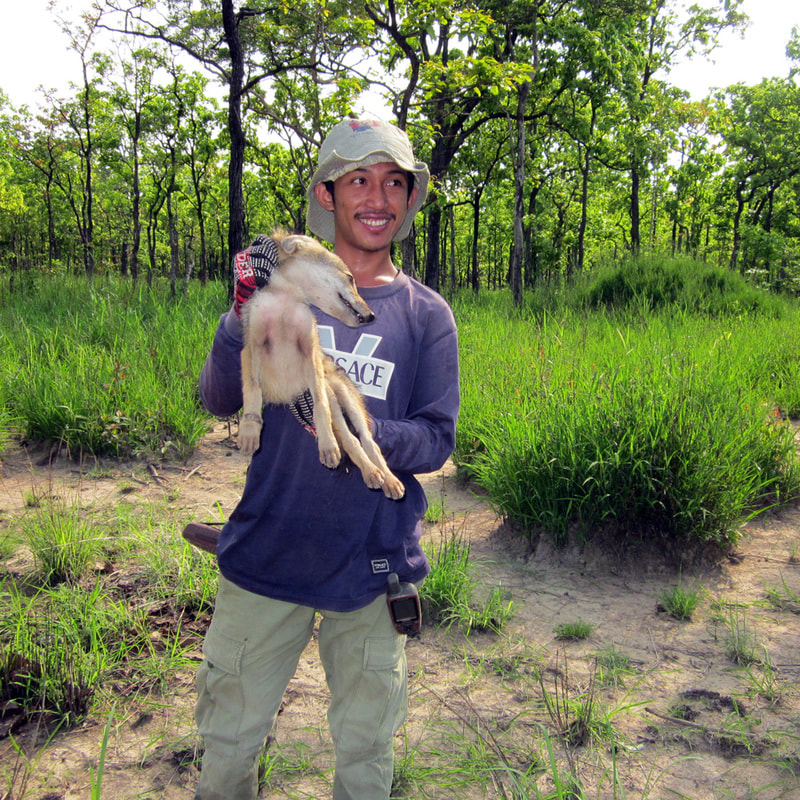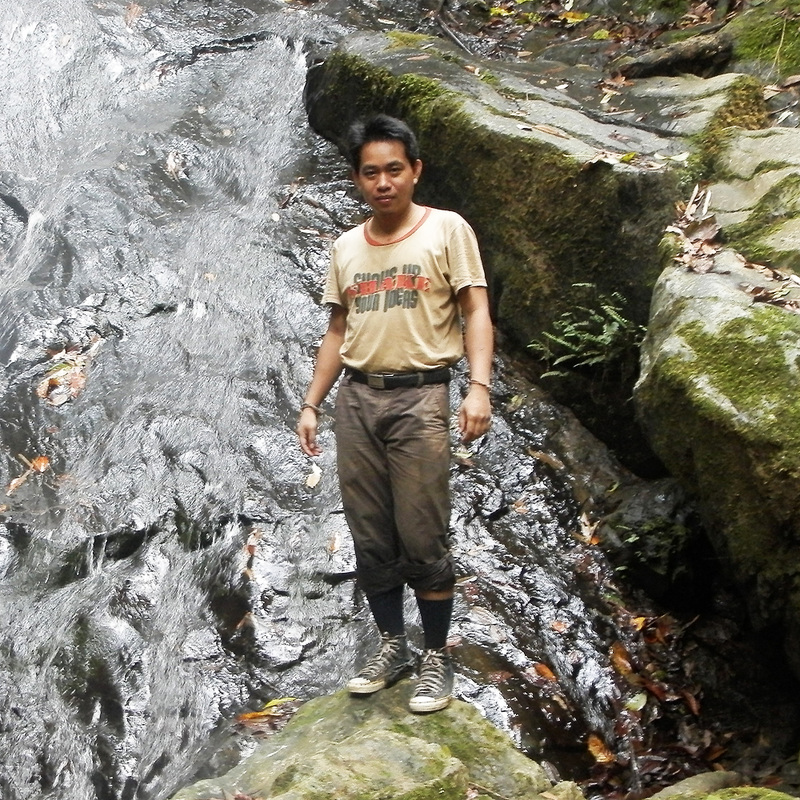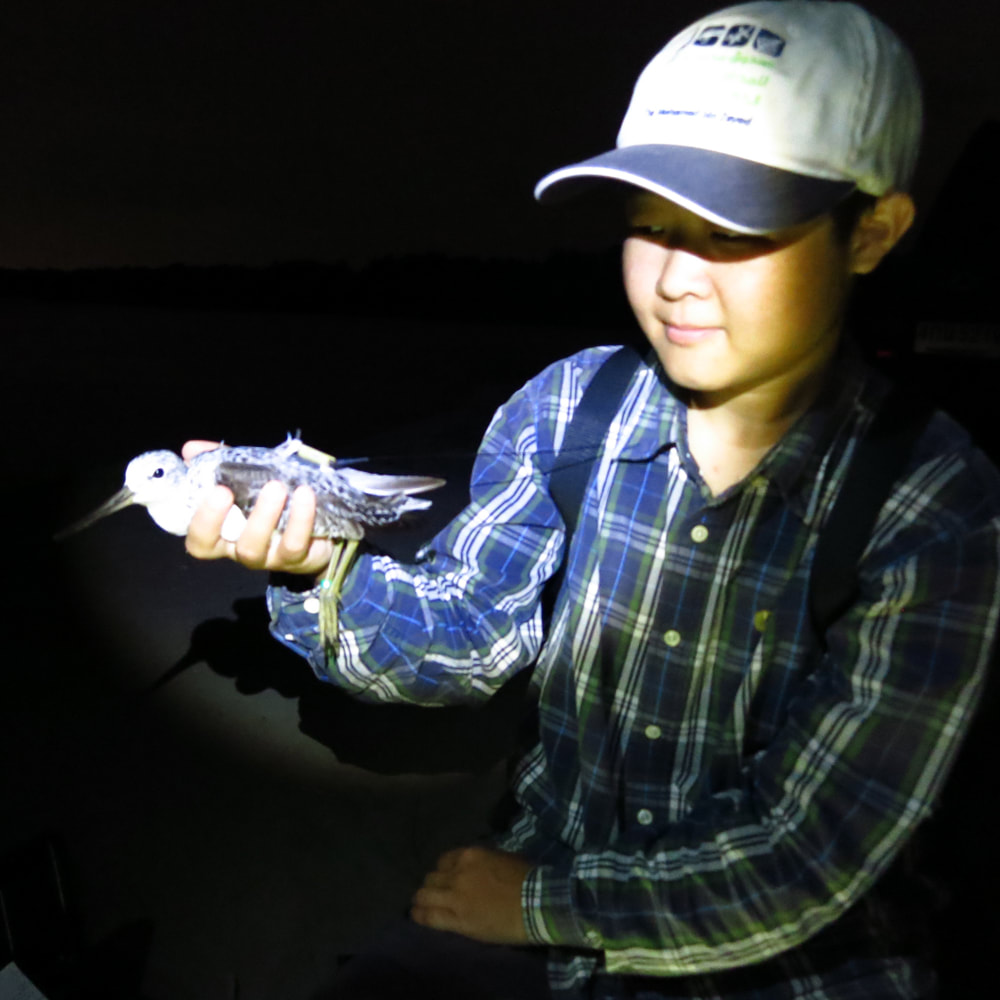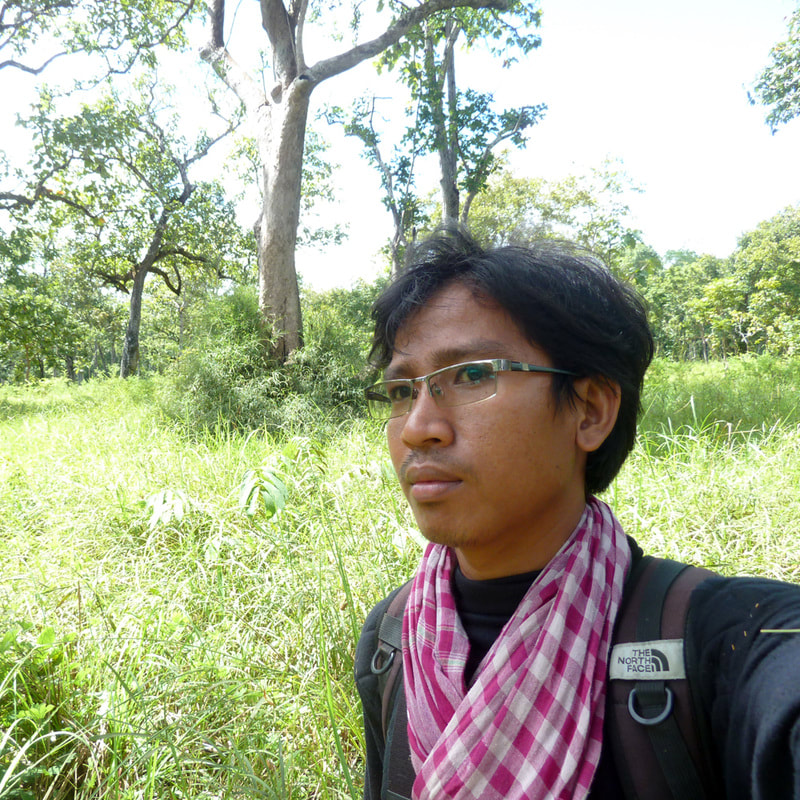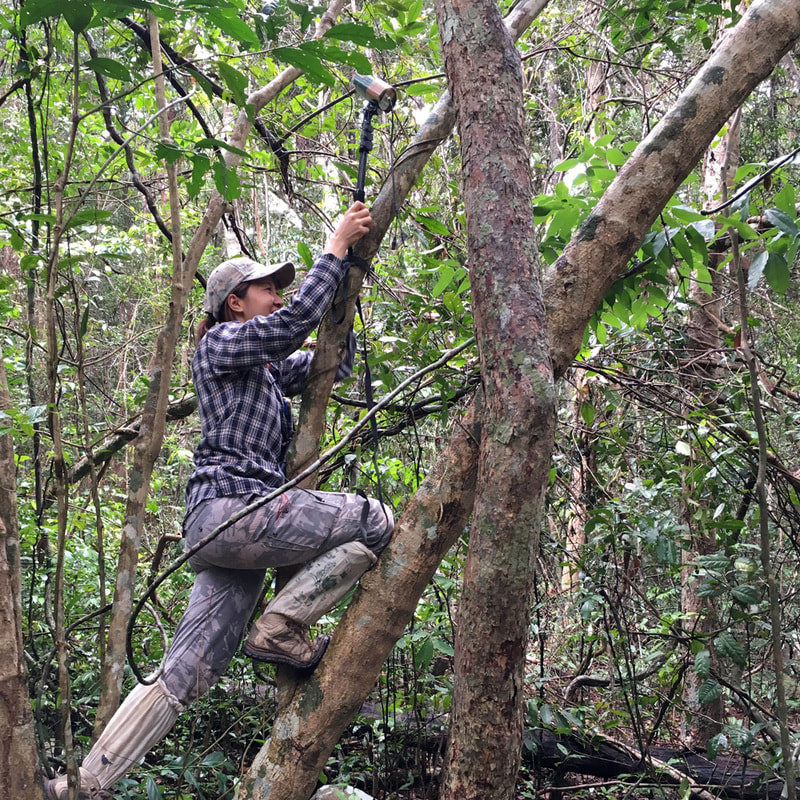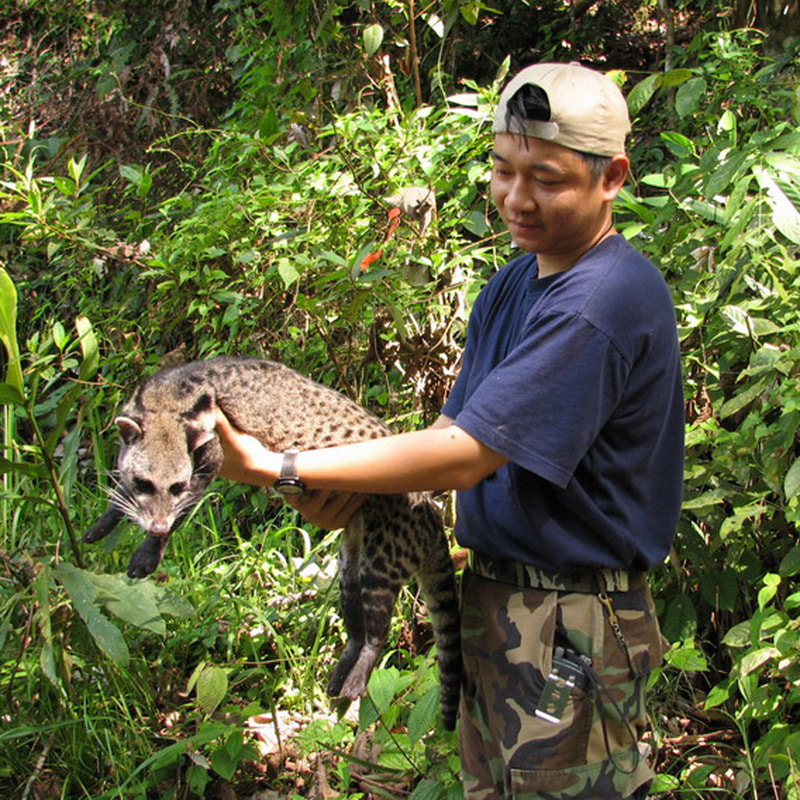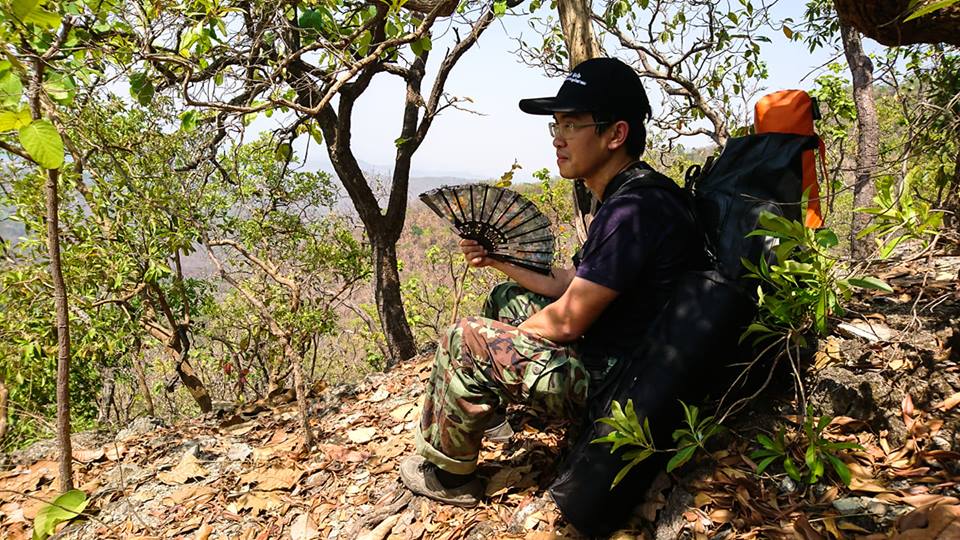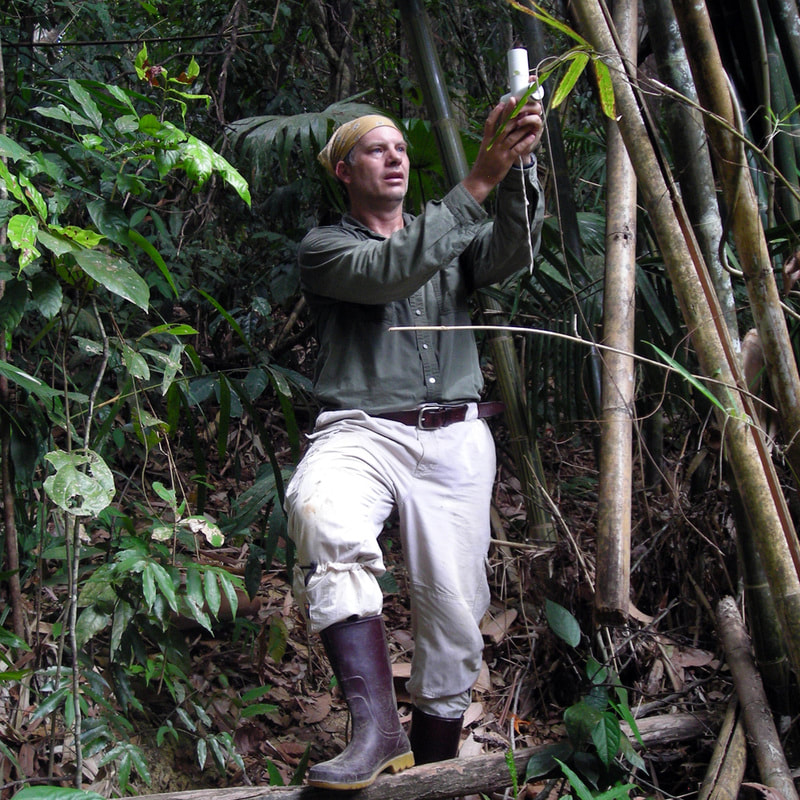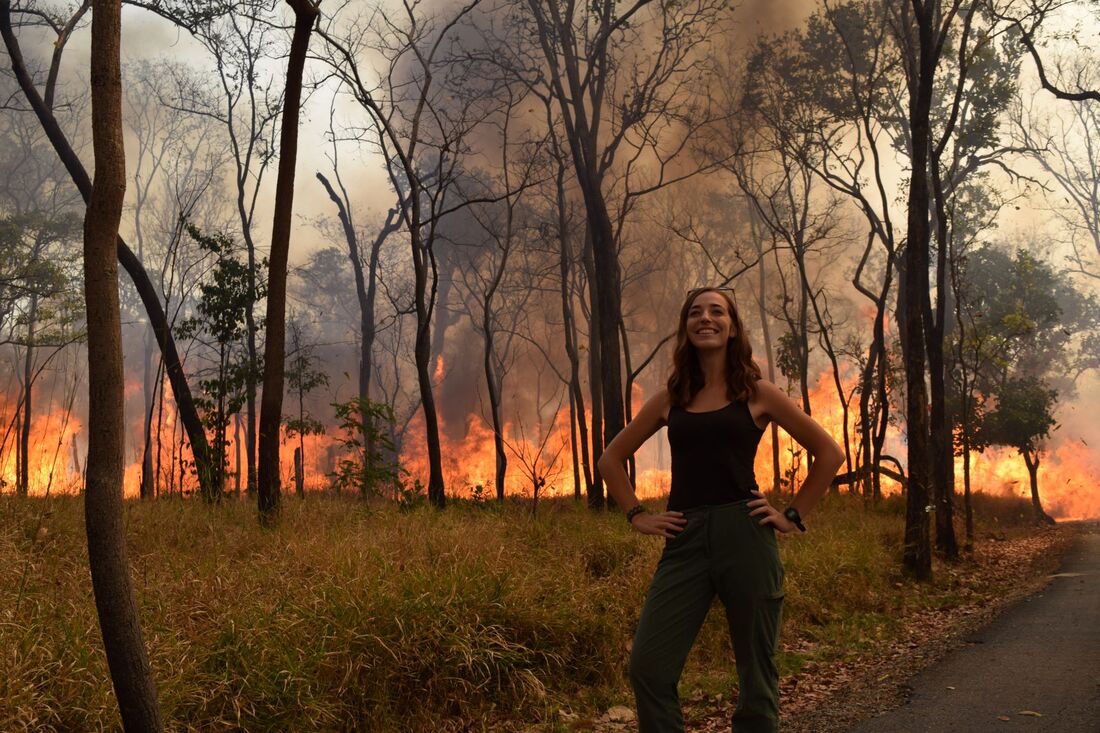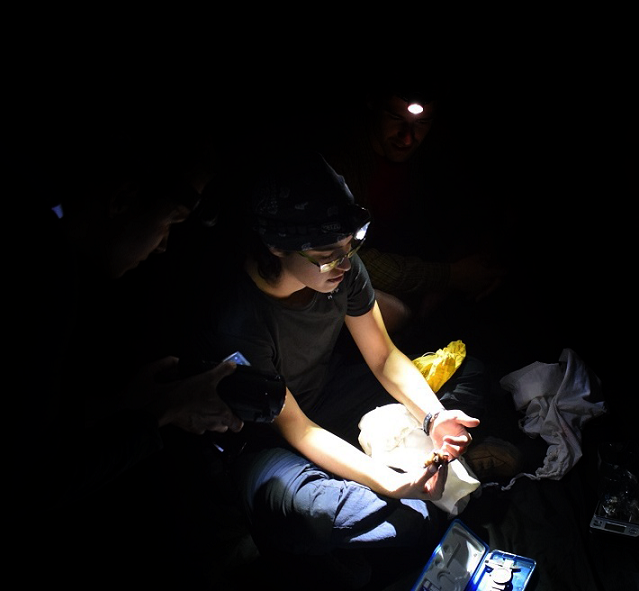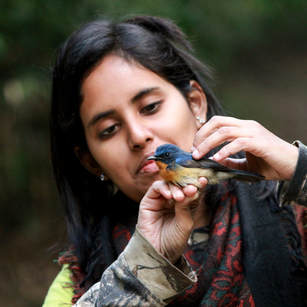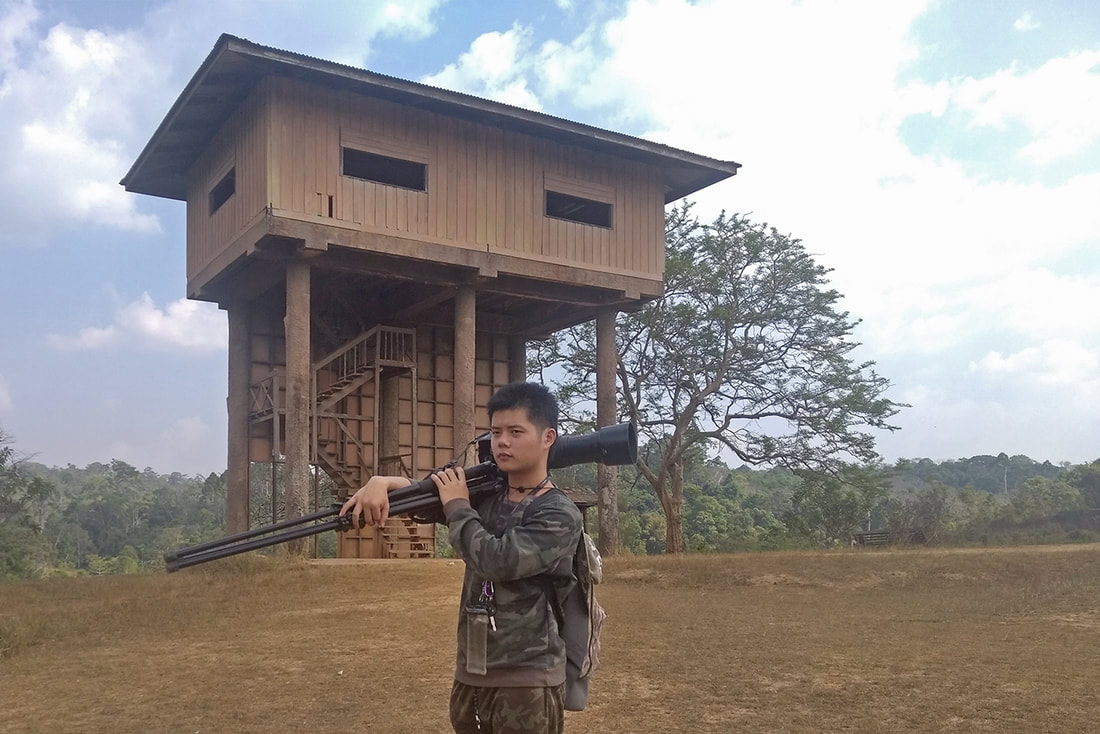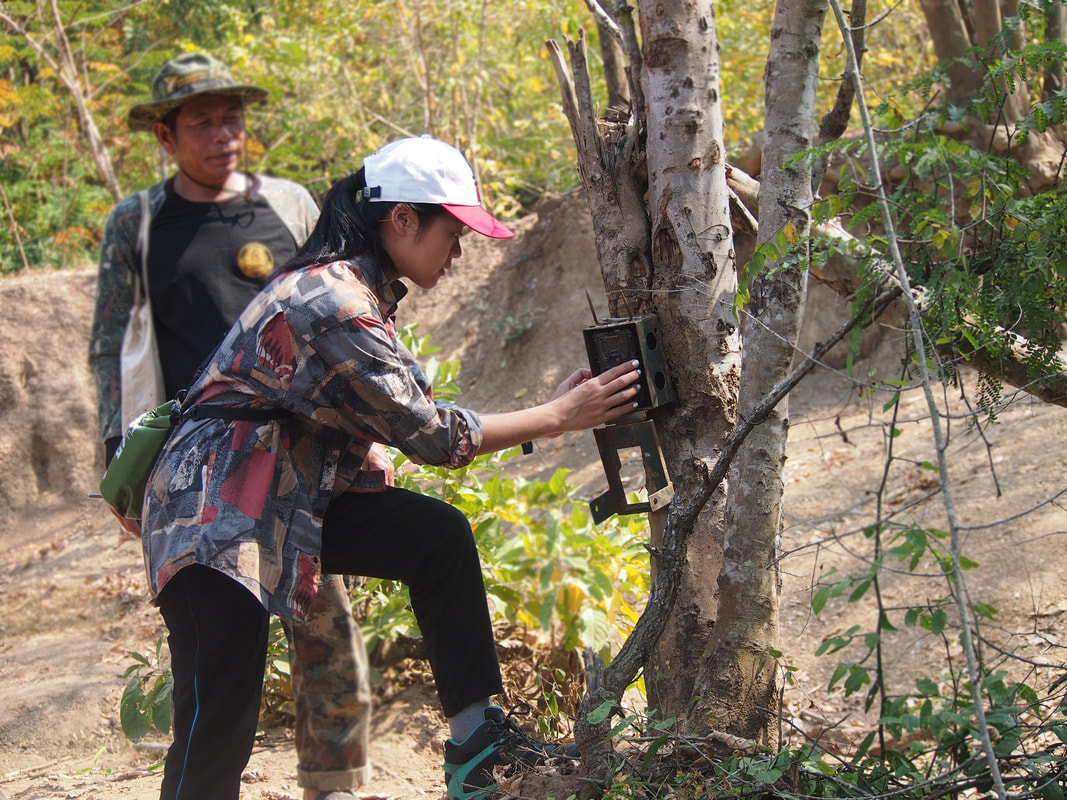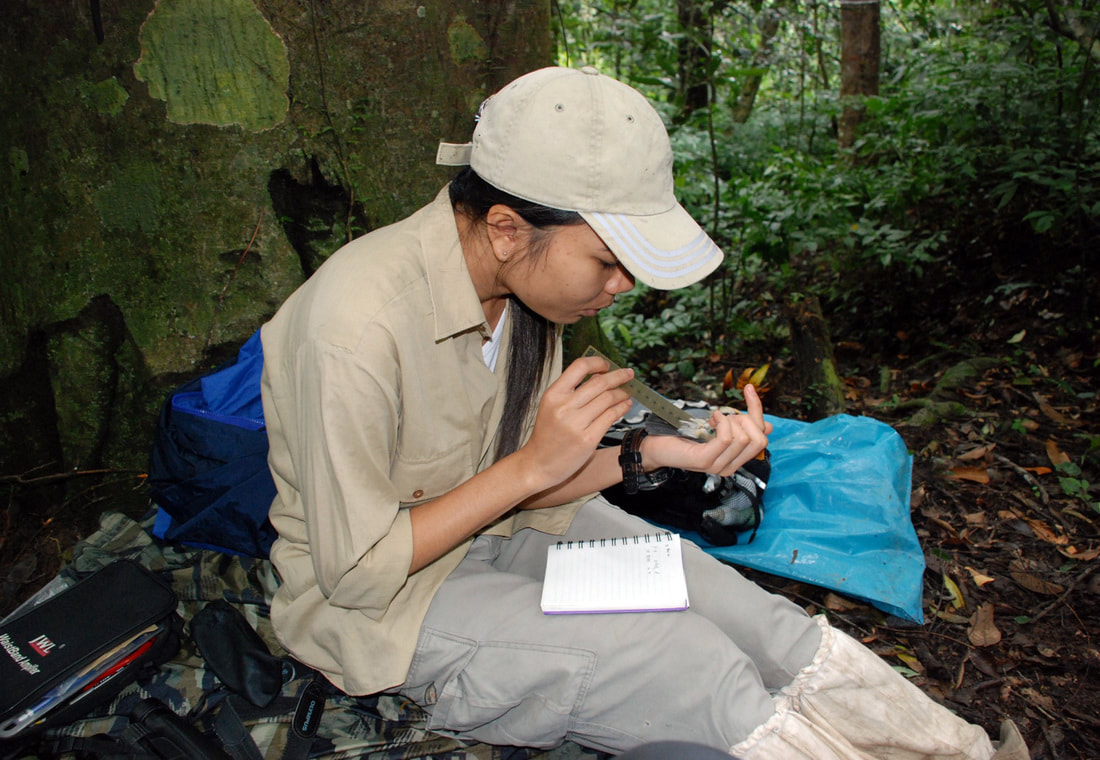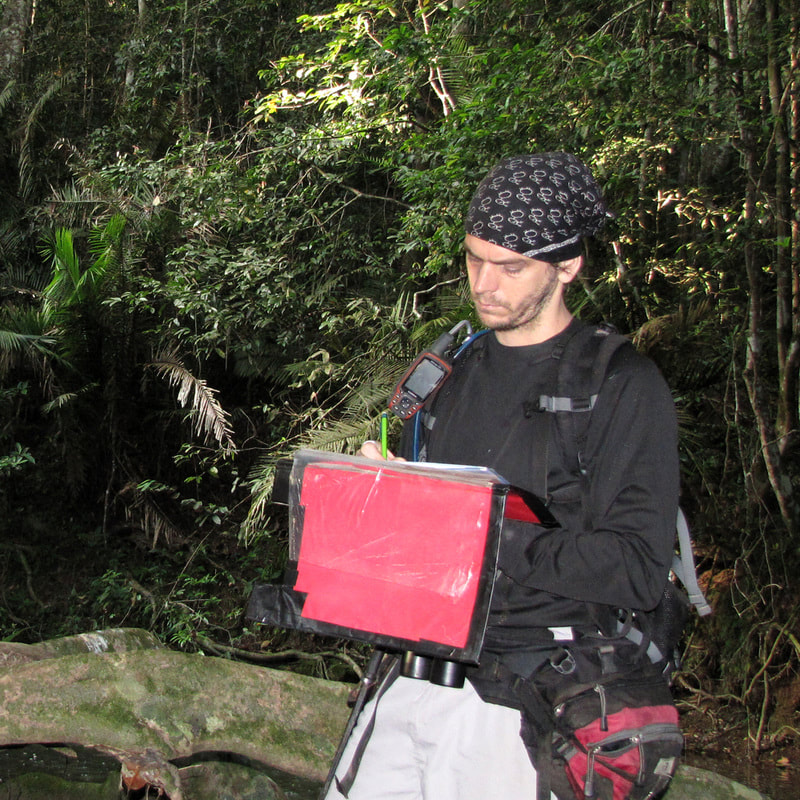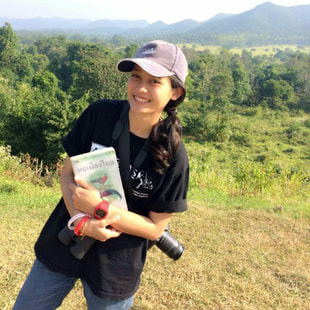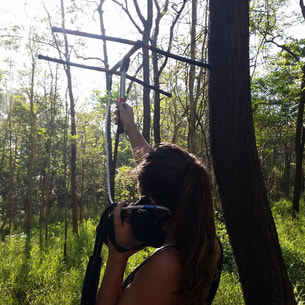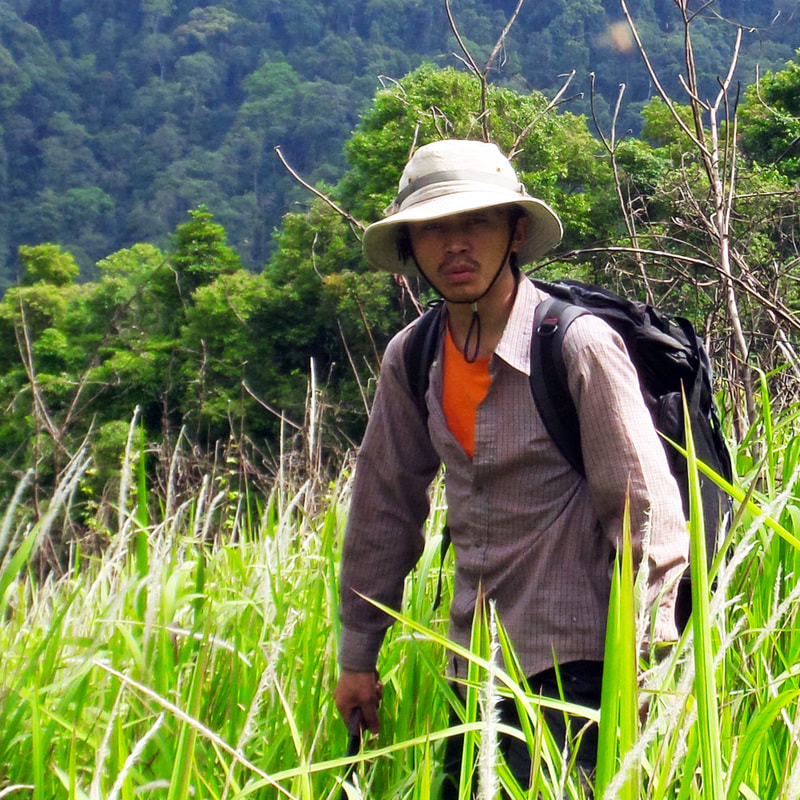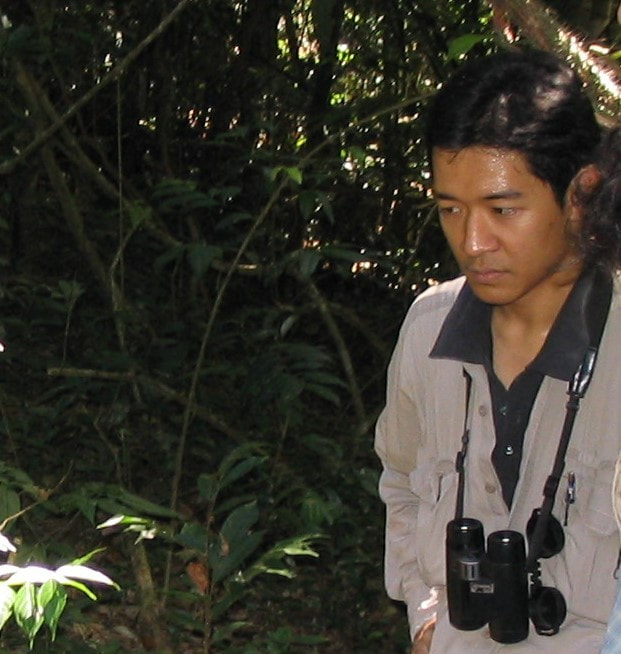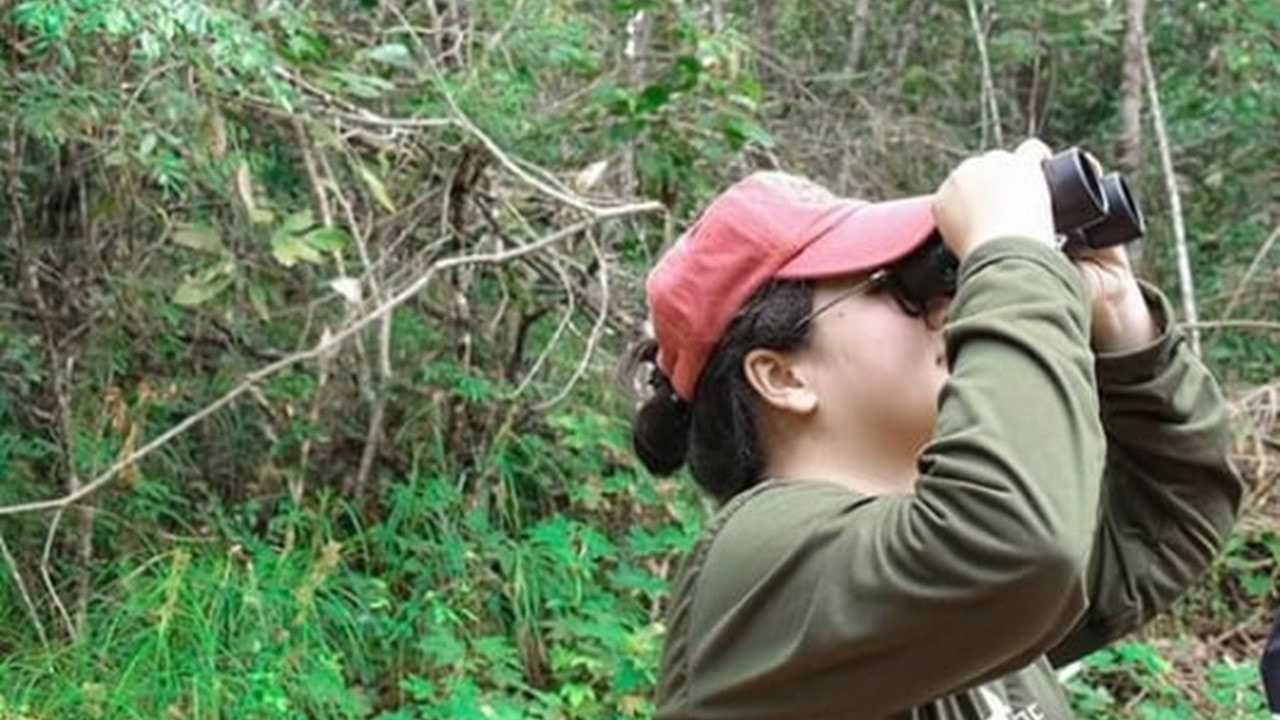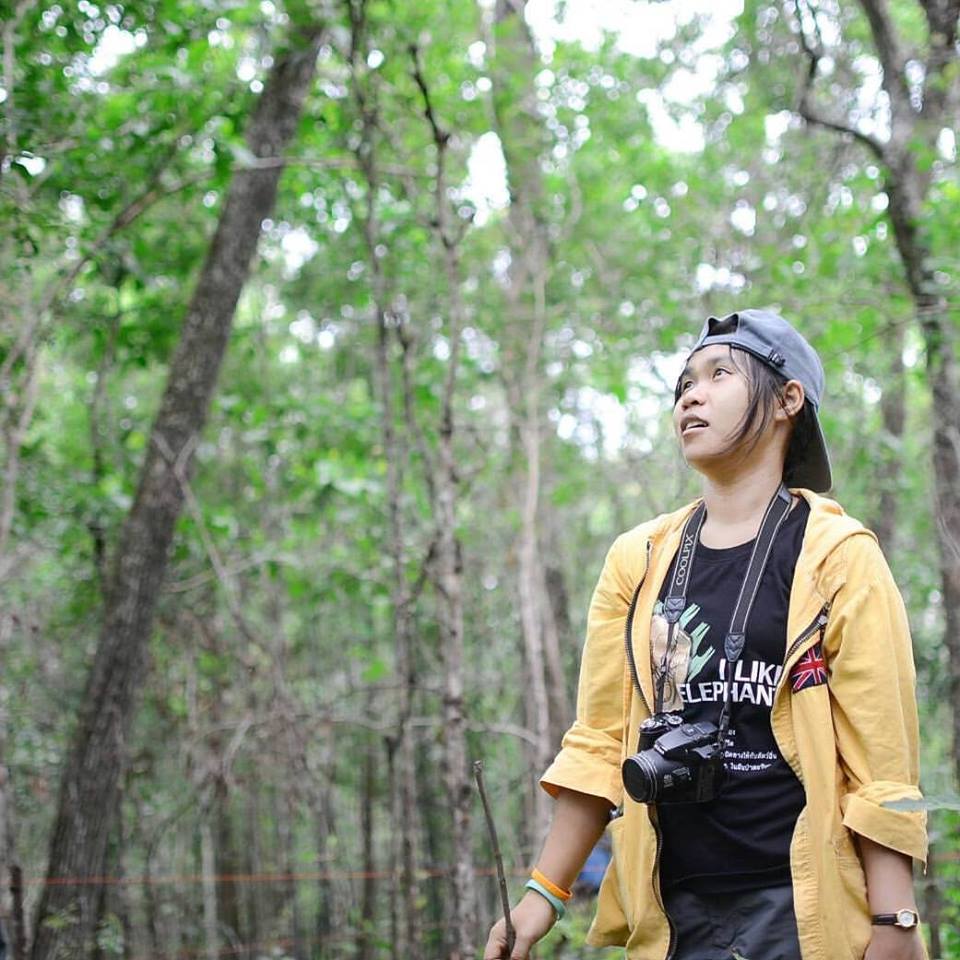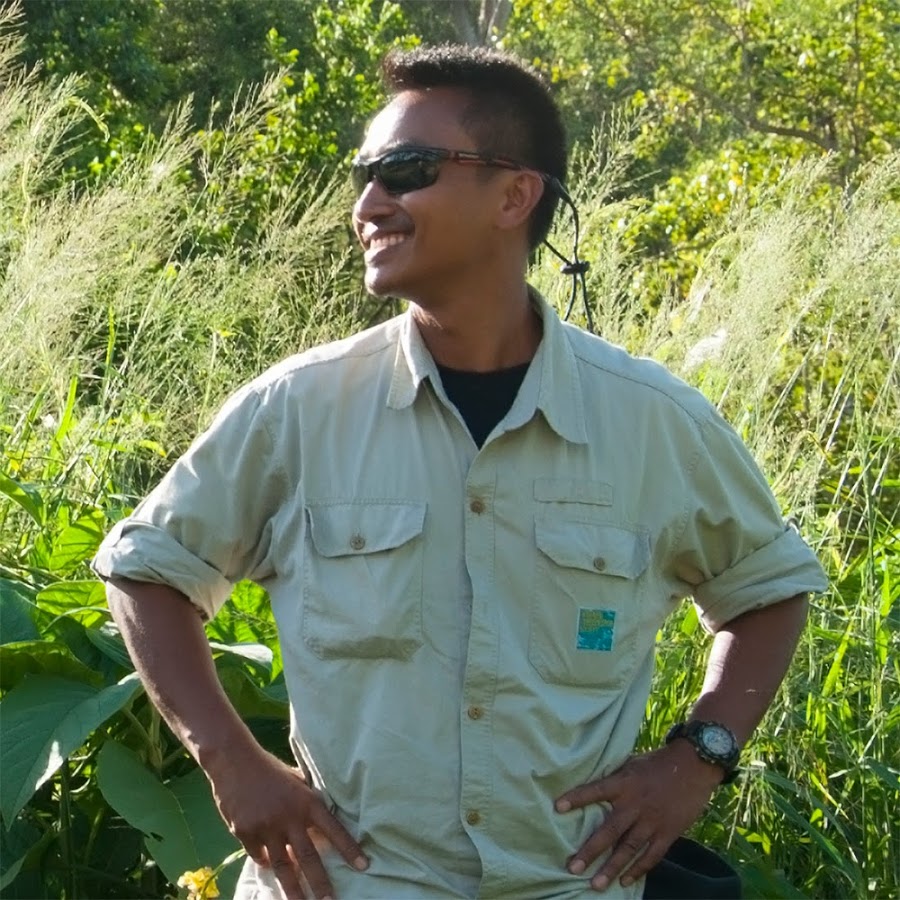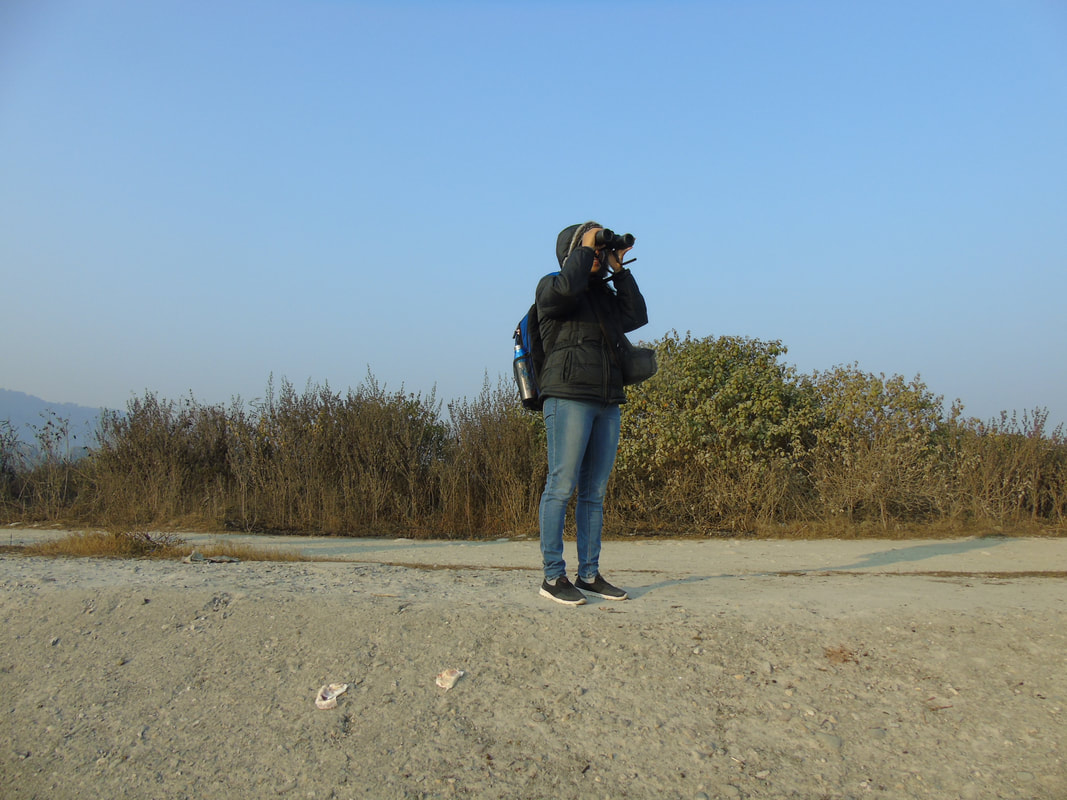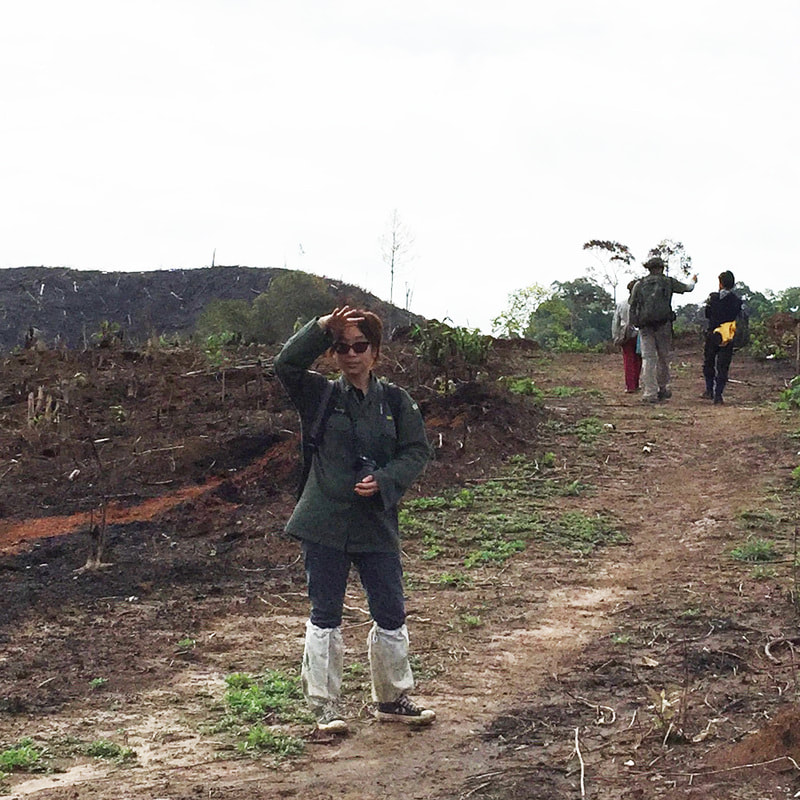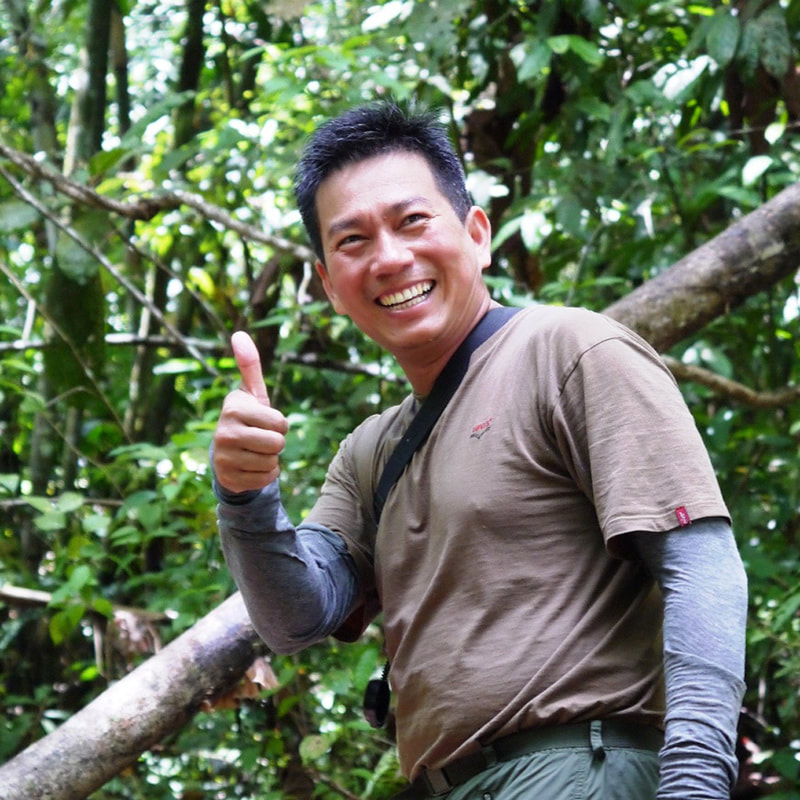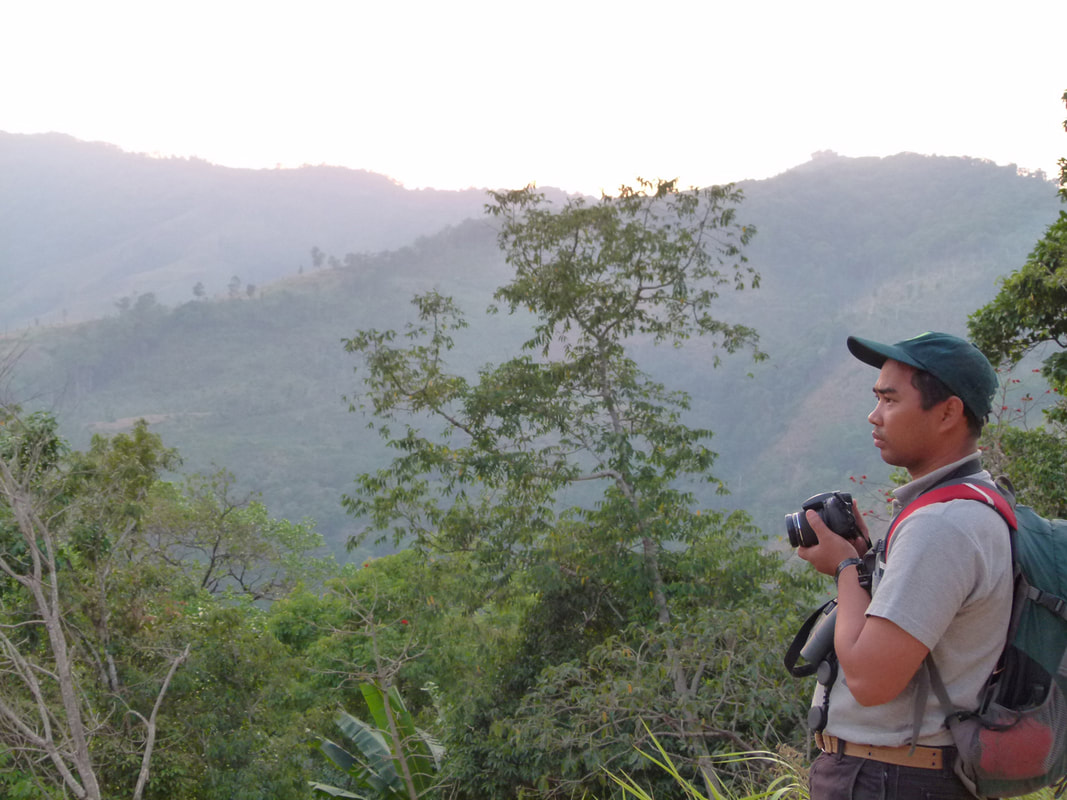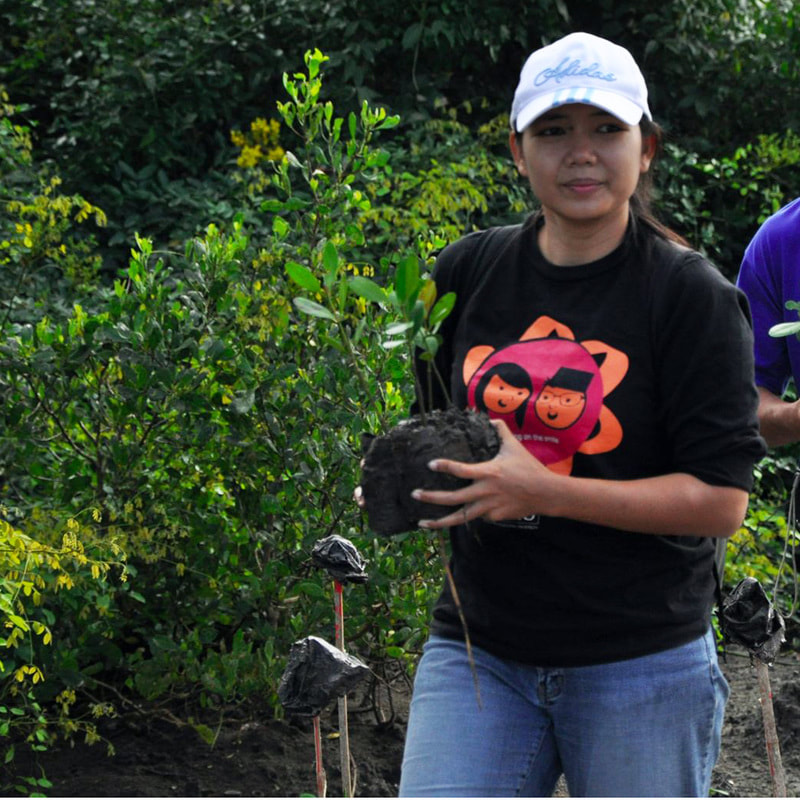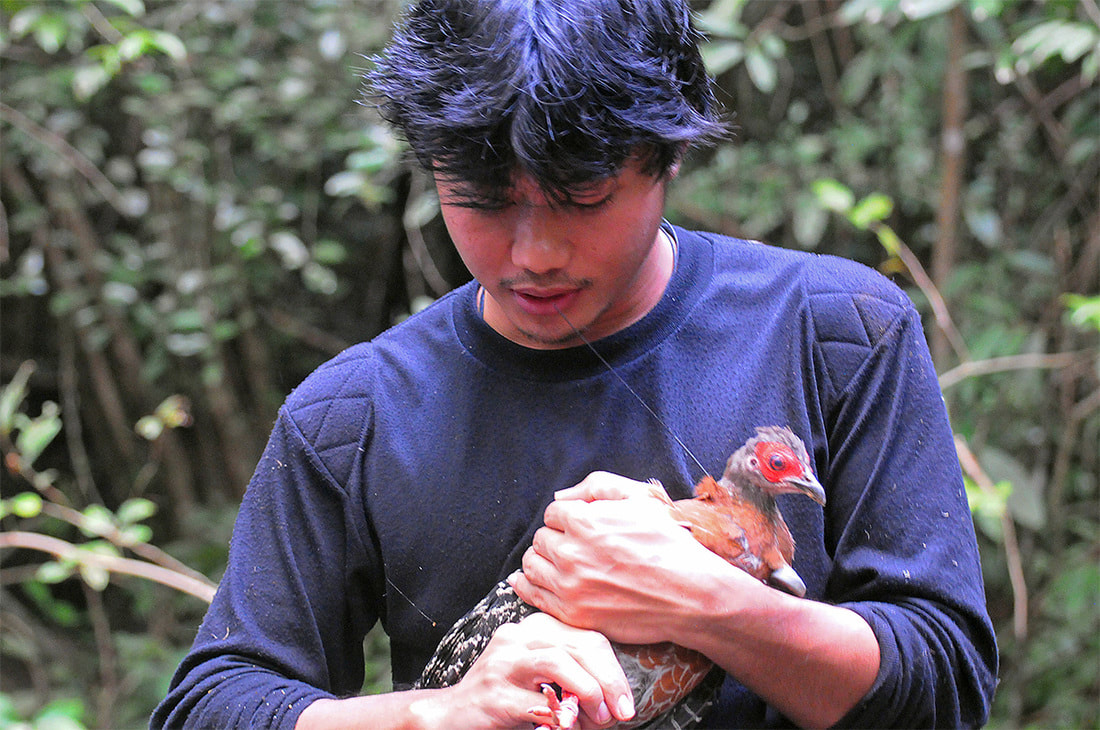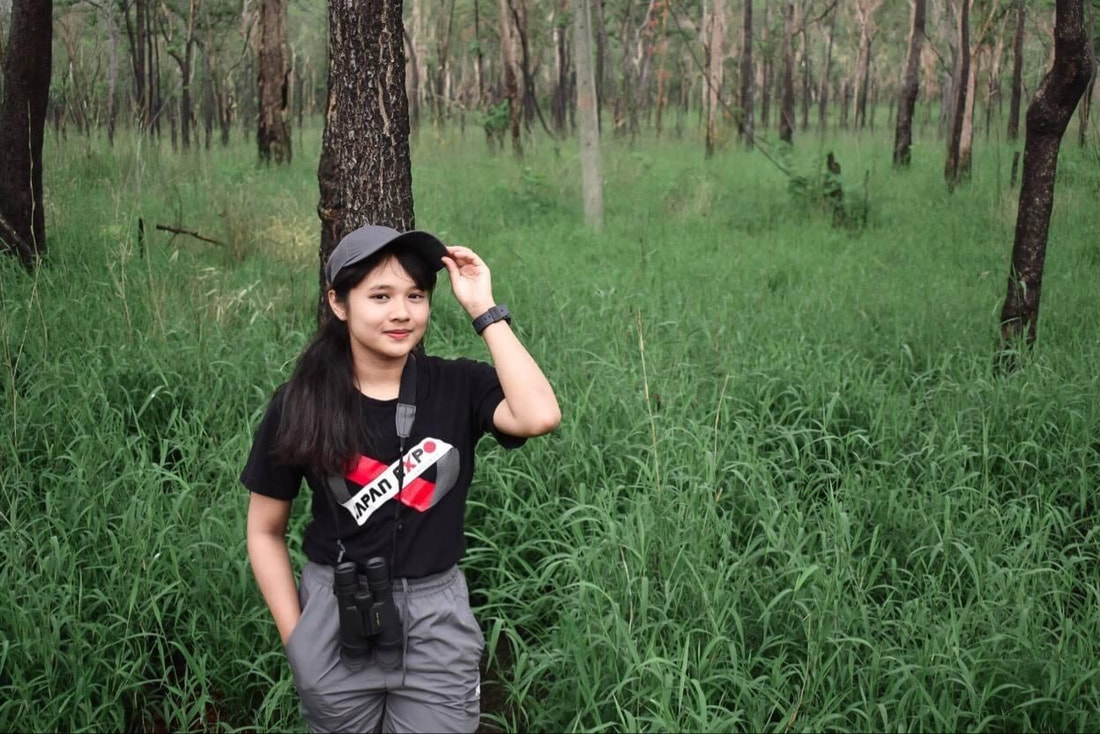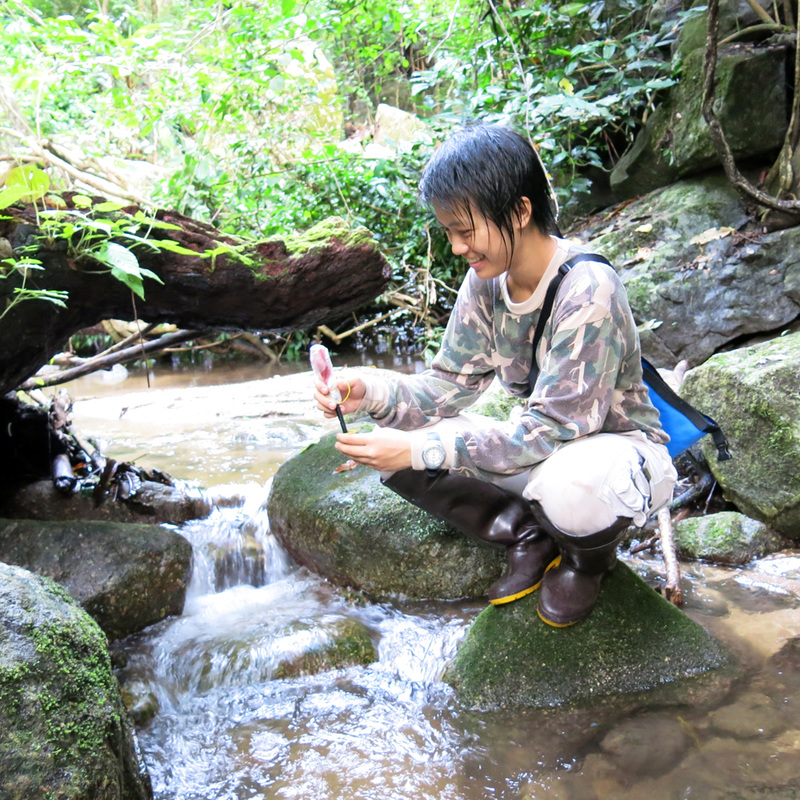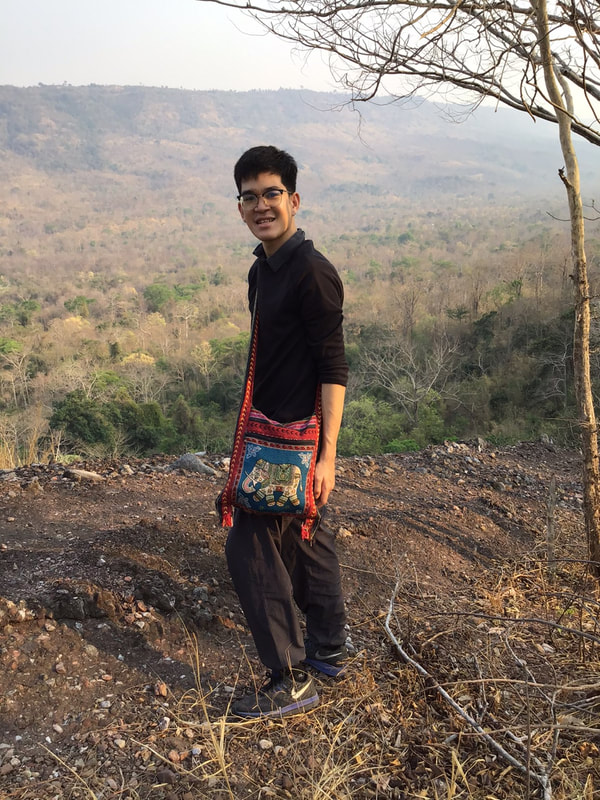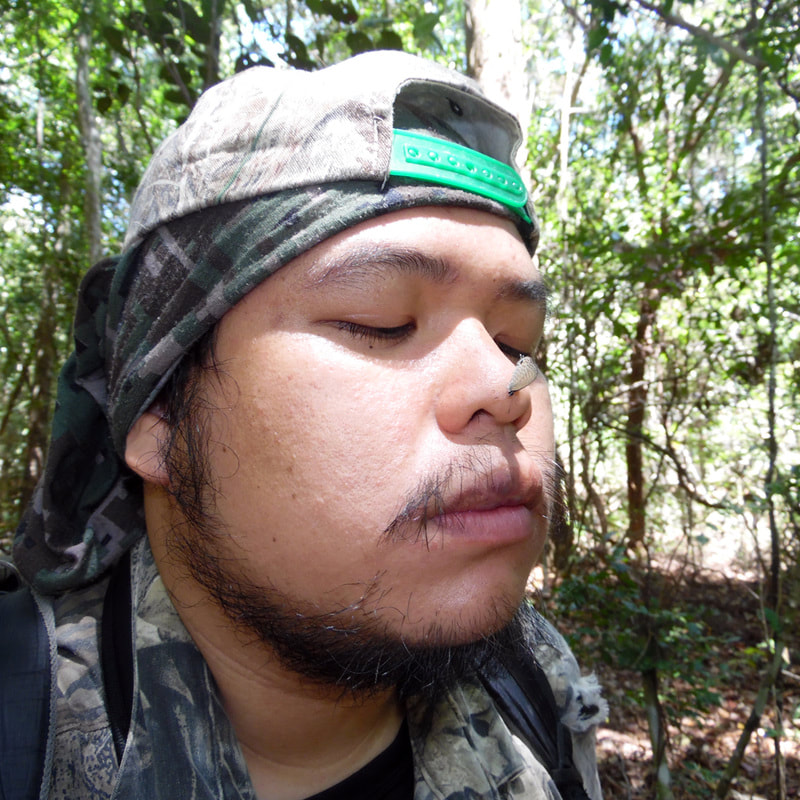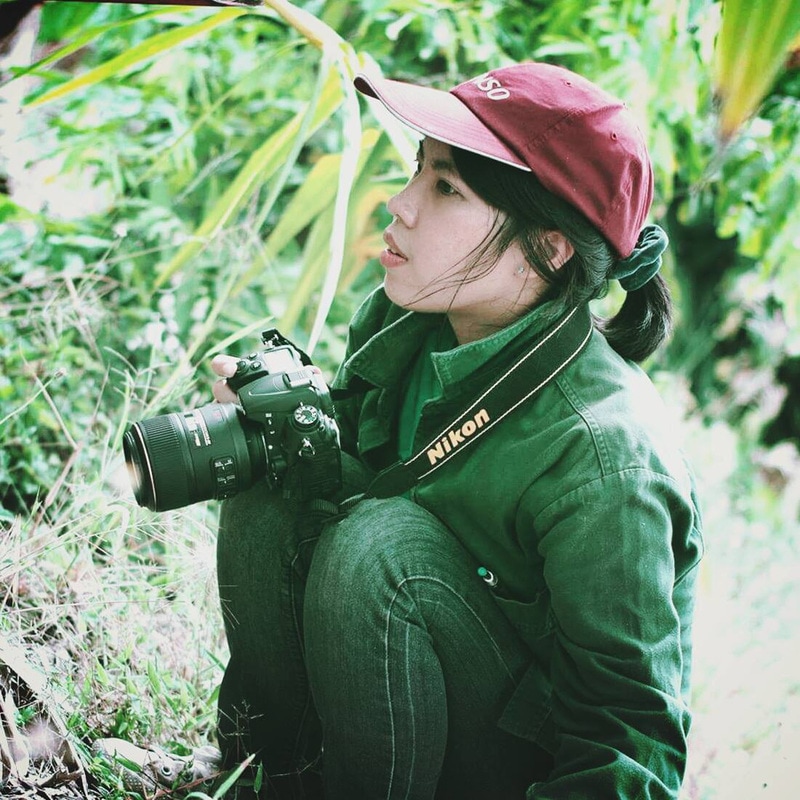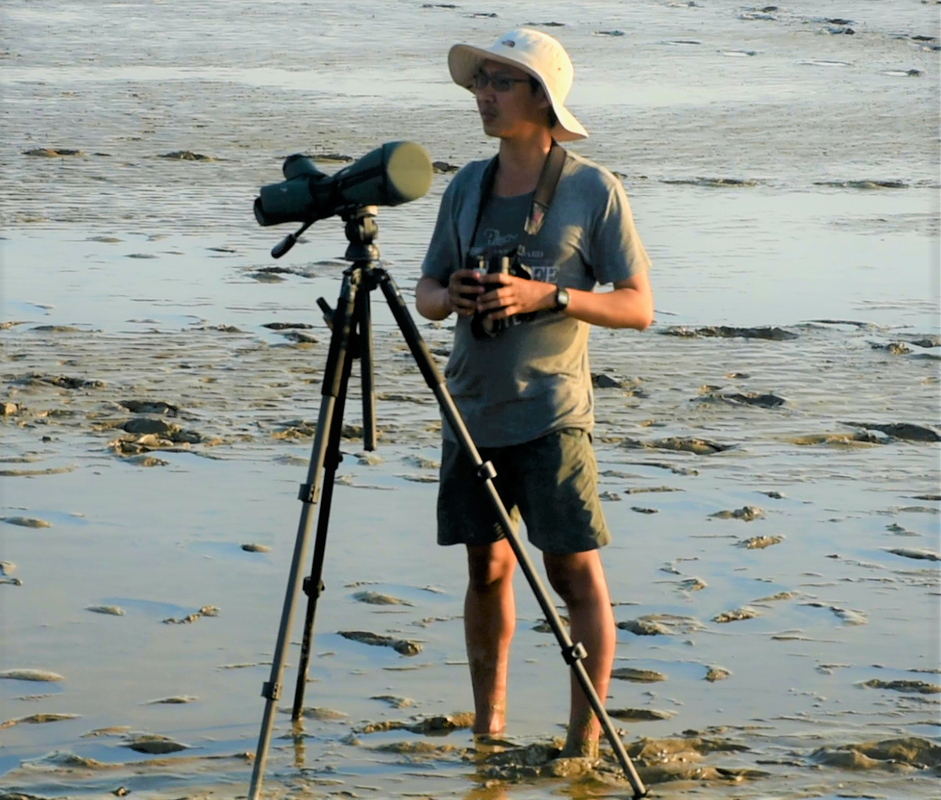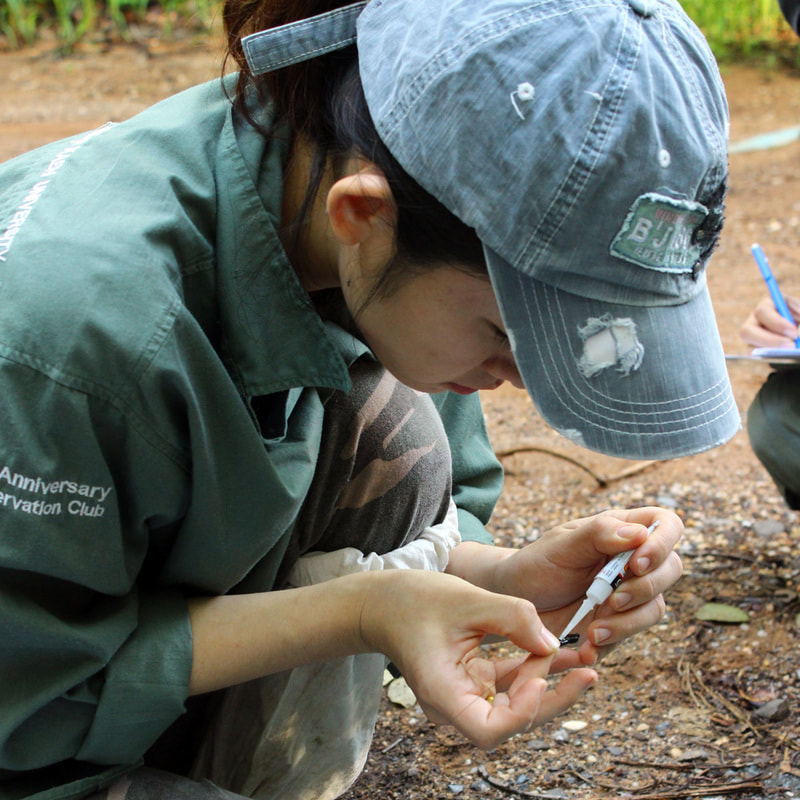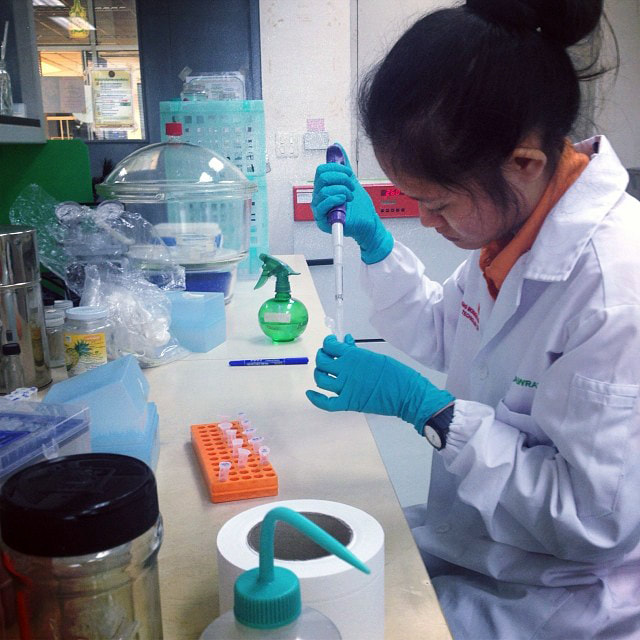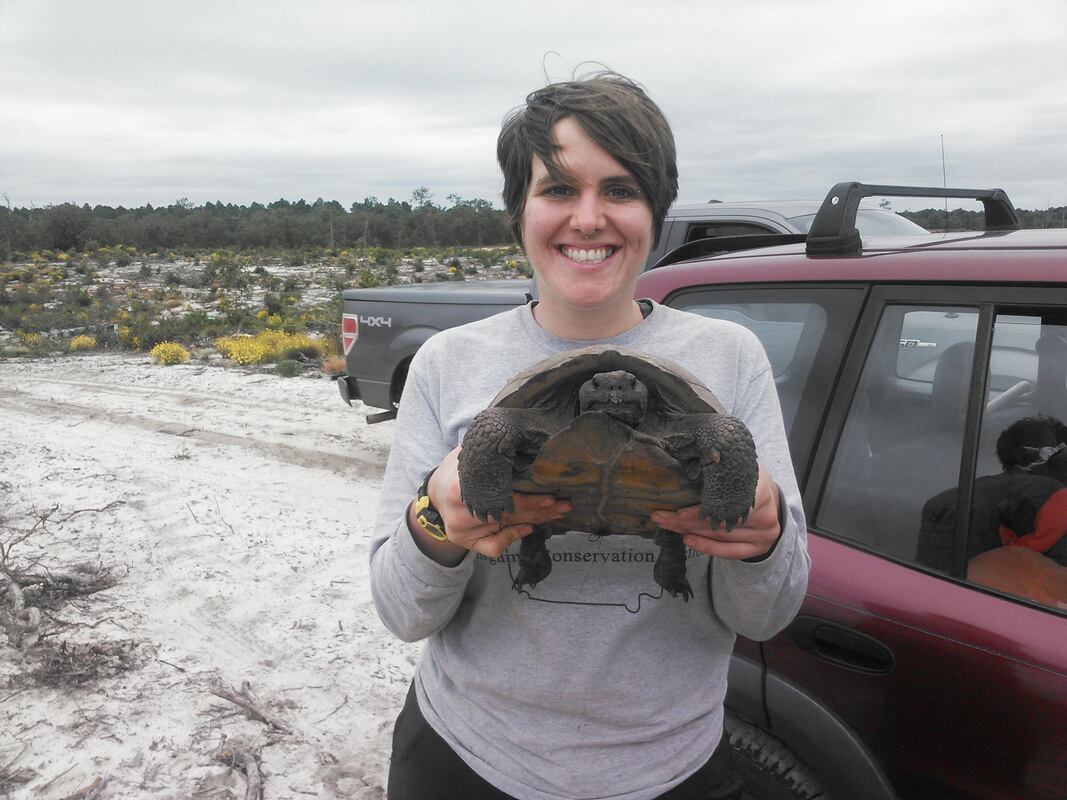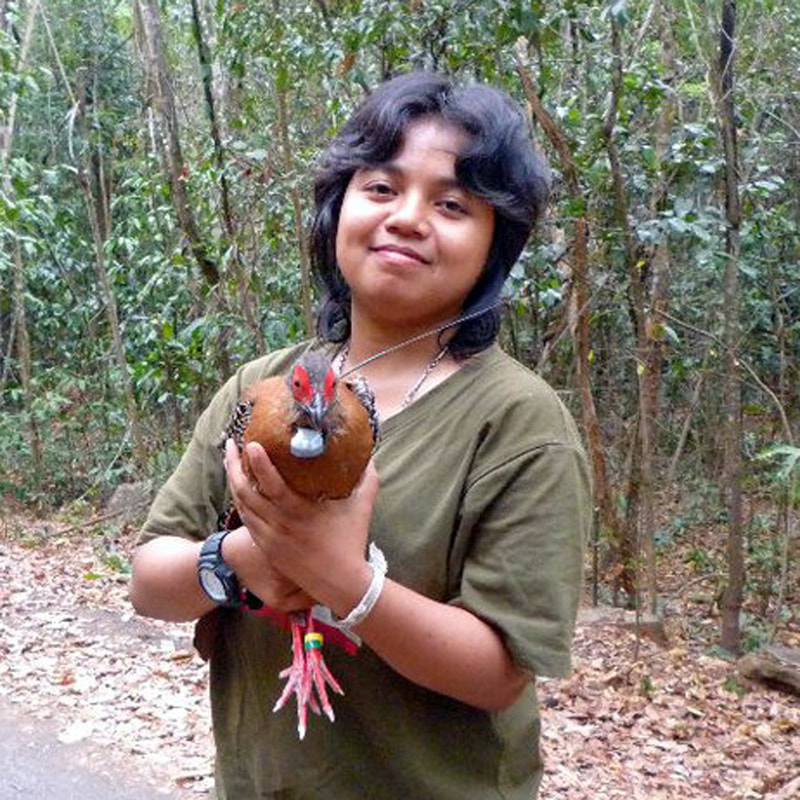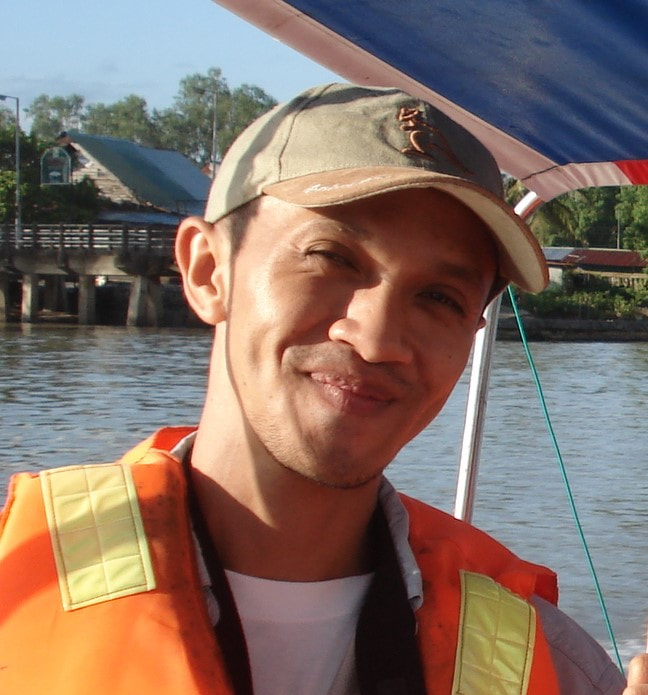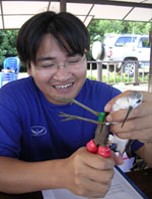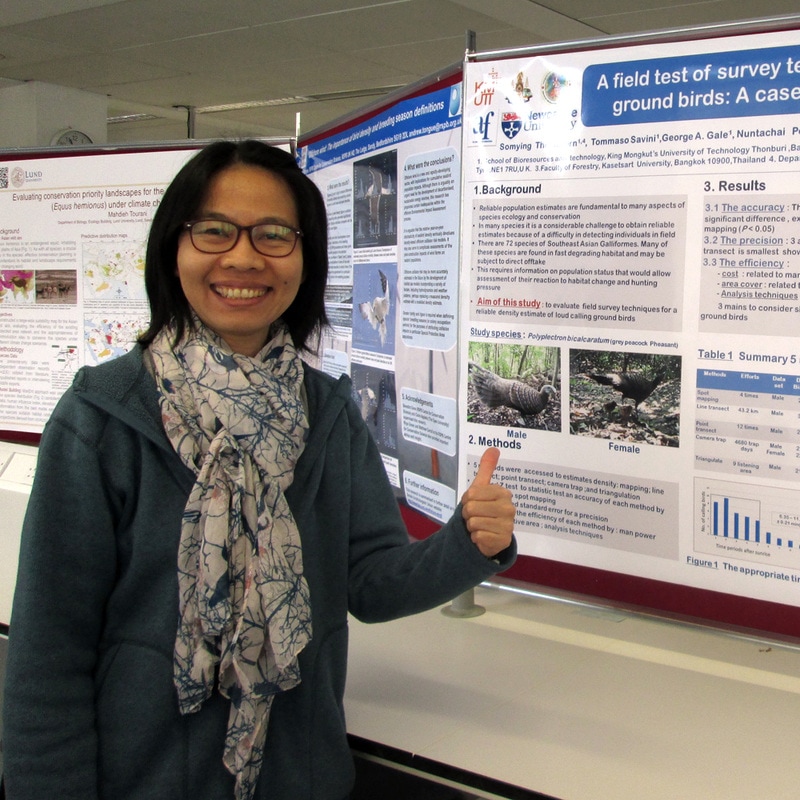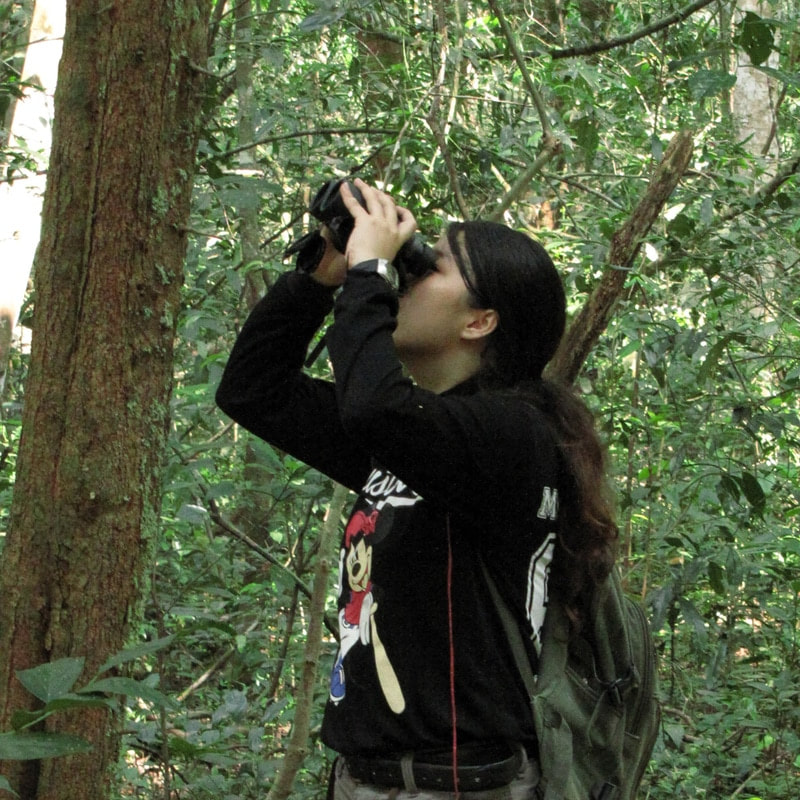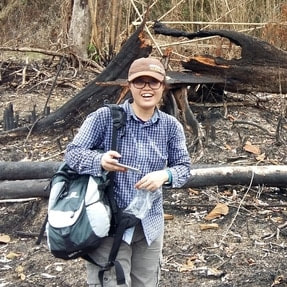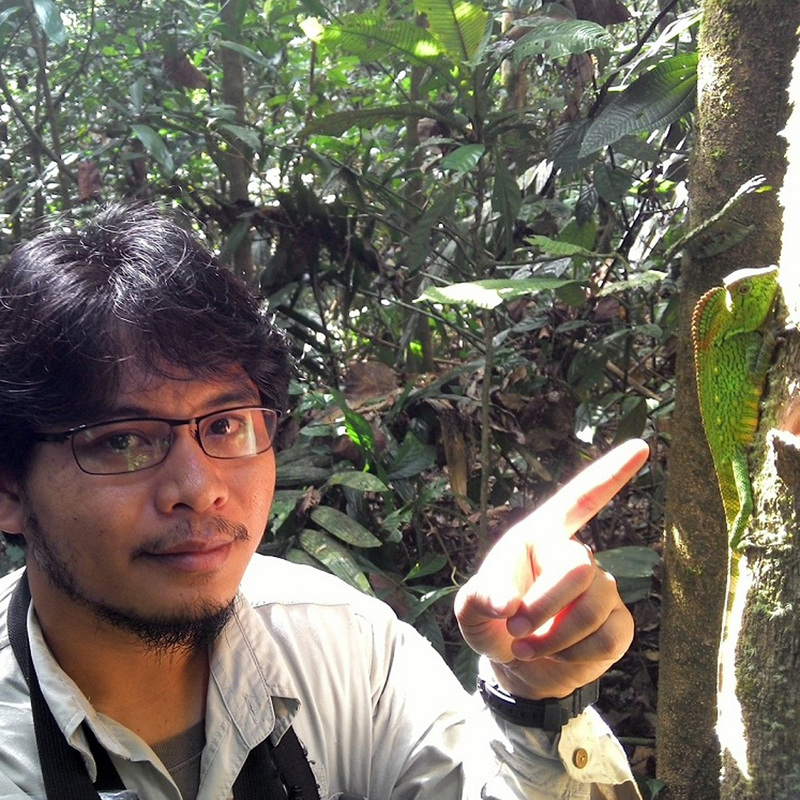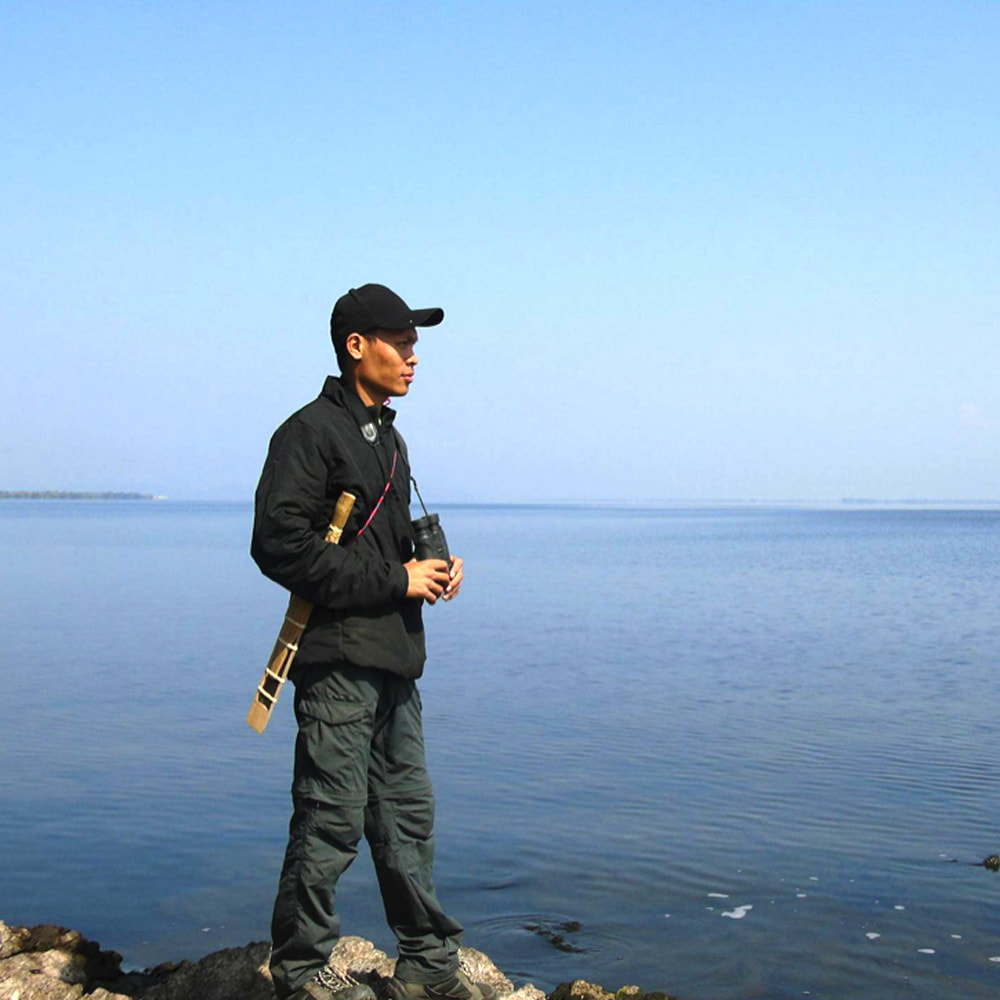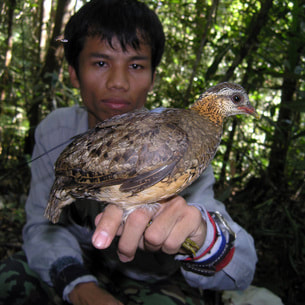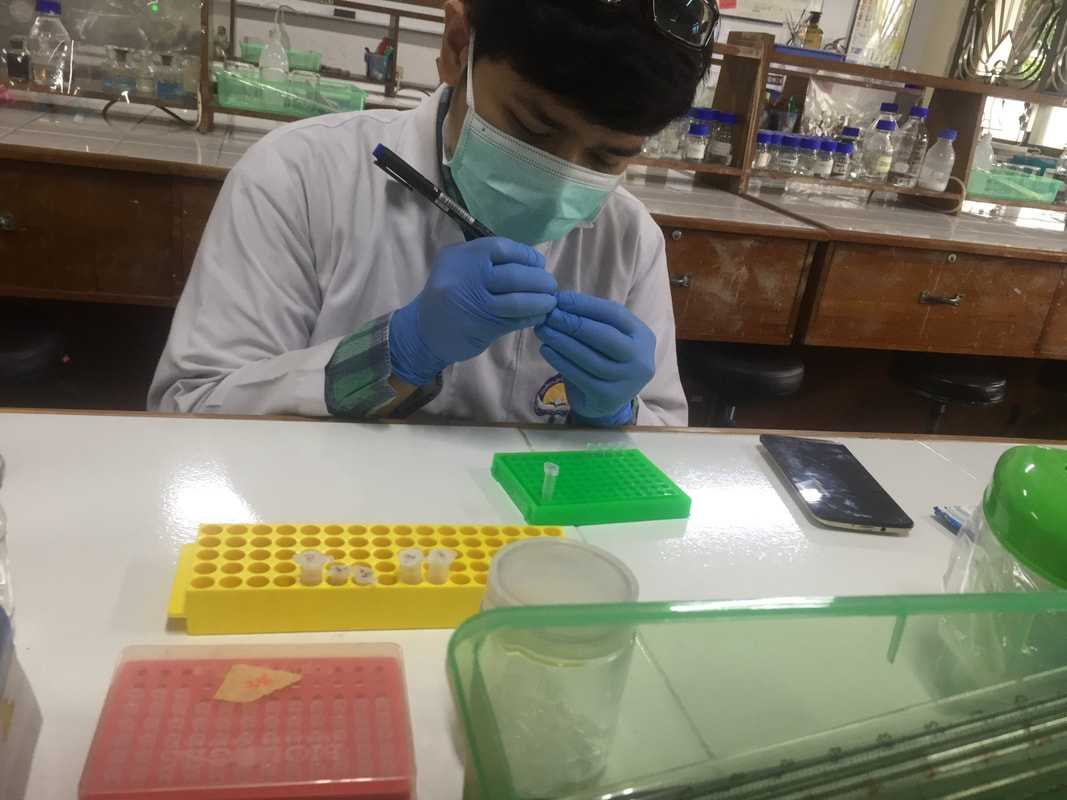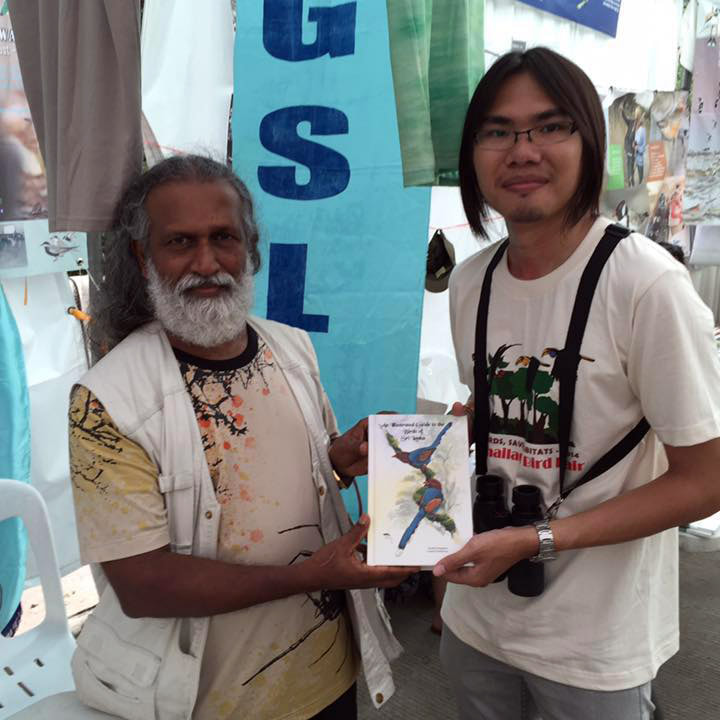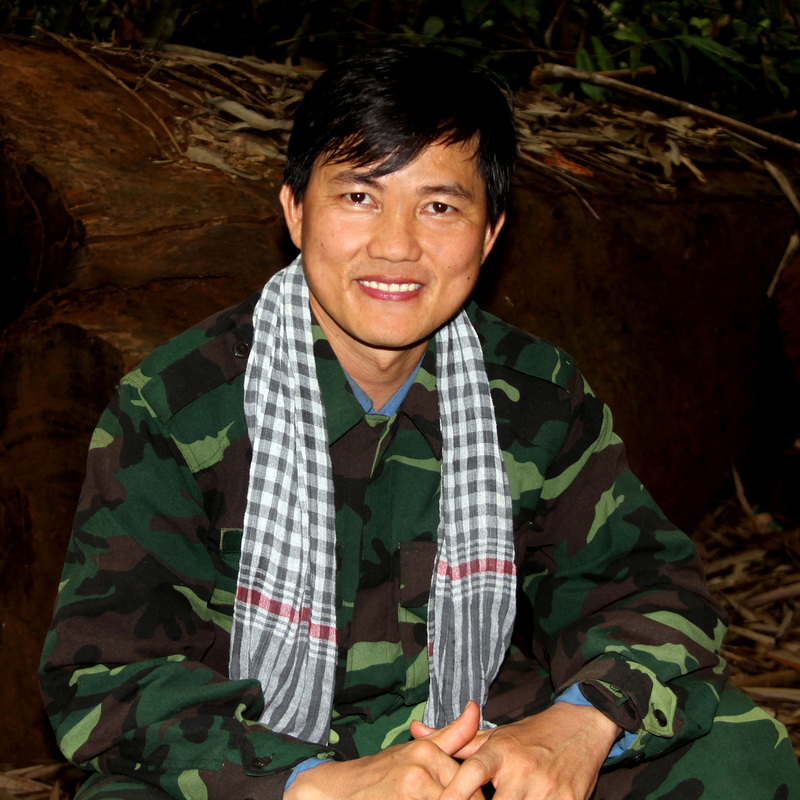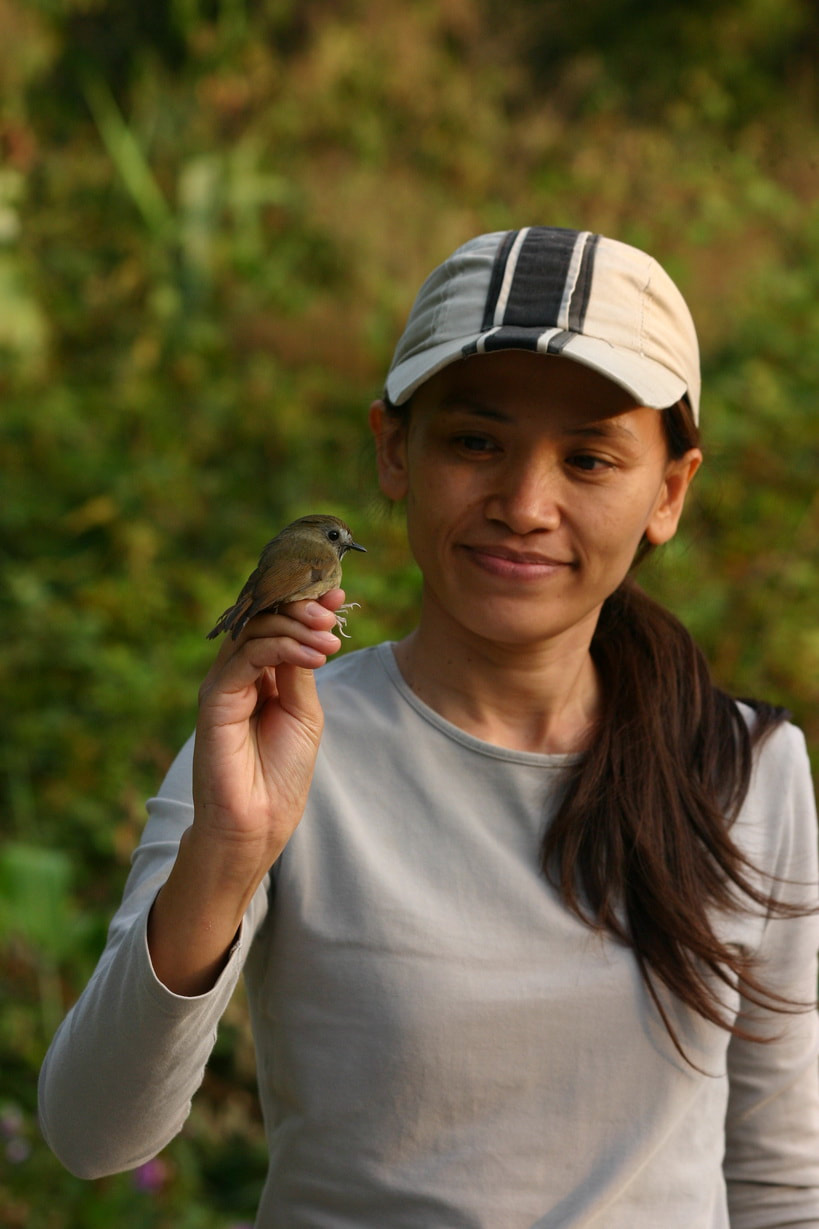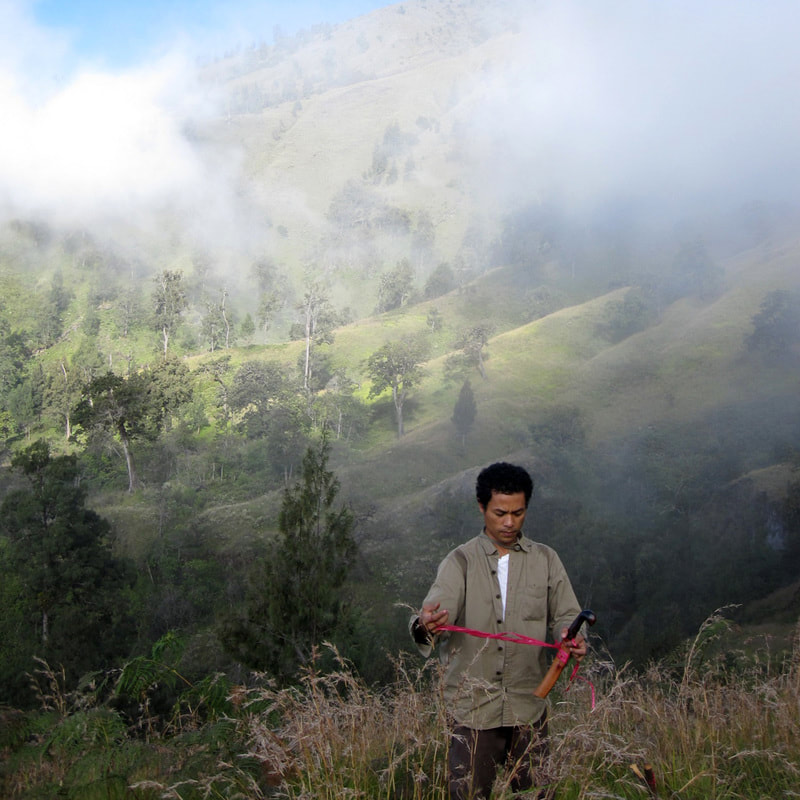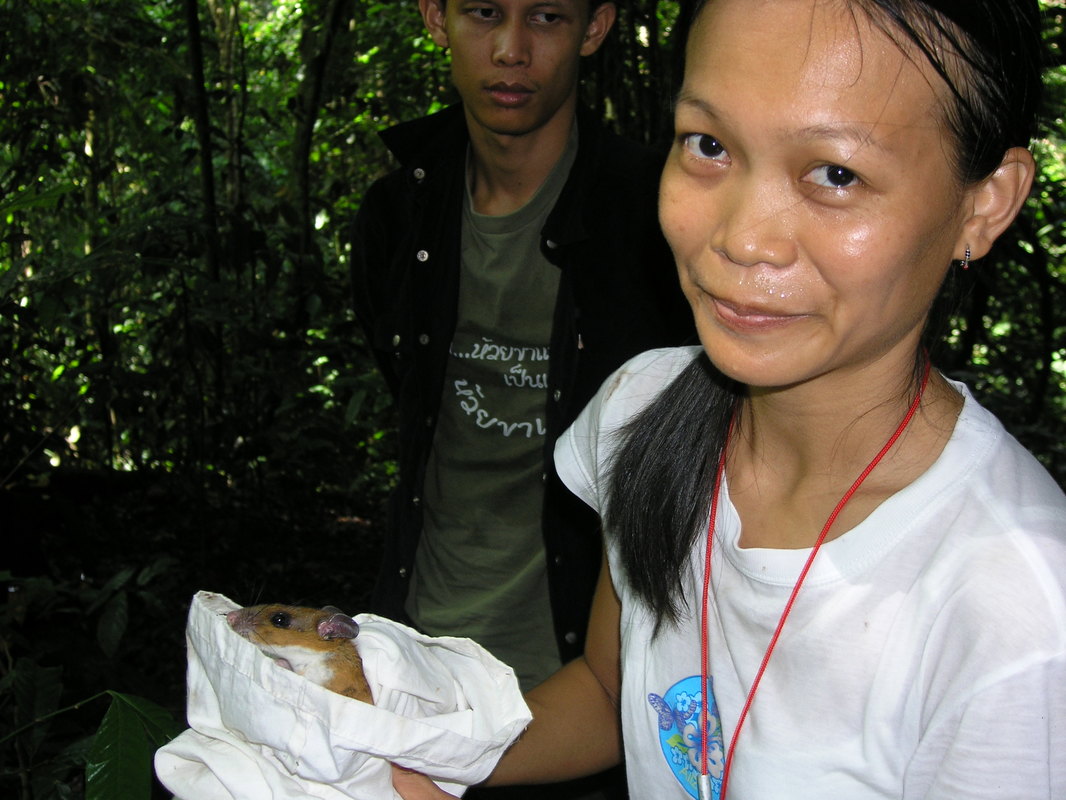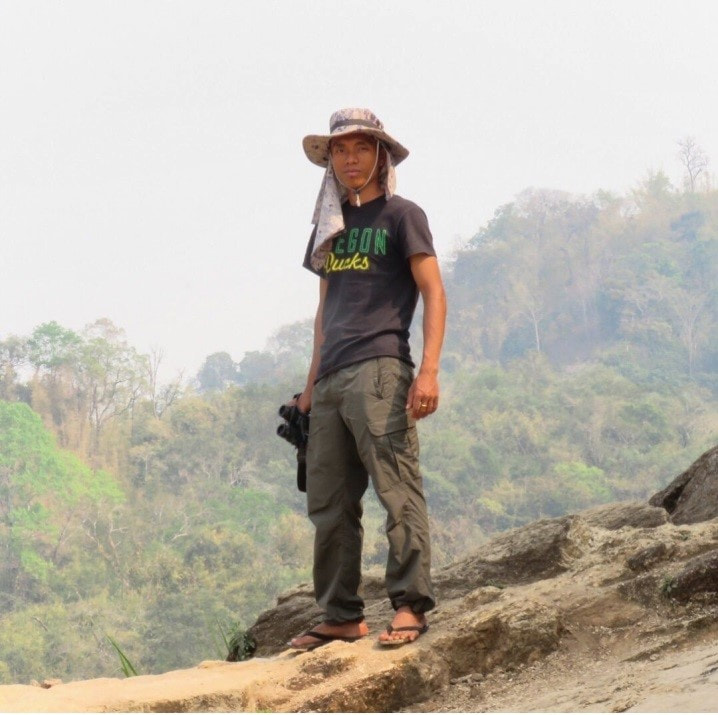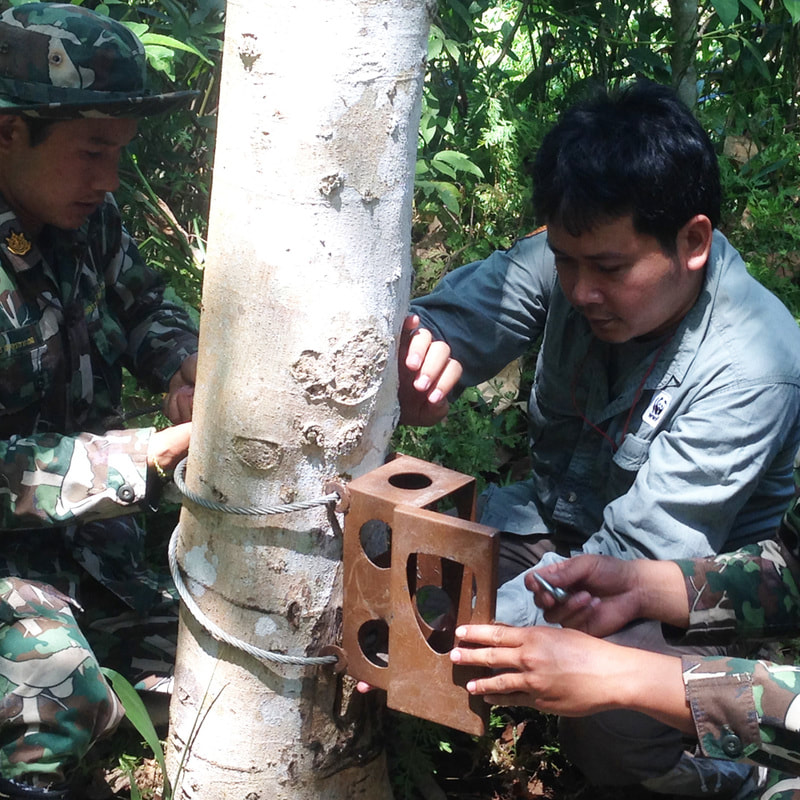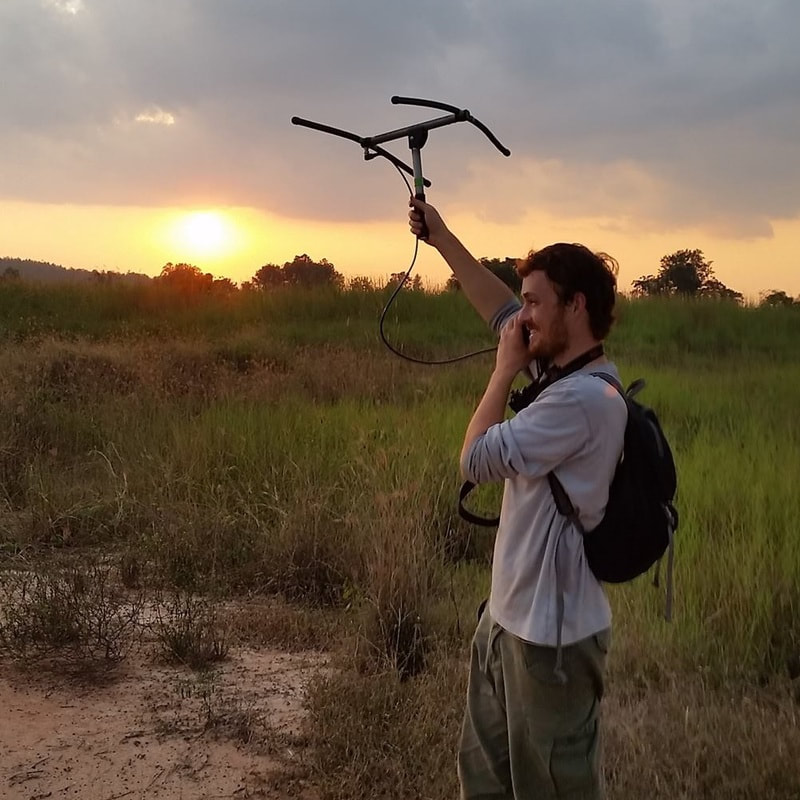Faculty serving as academic advisers
|
Assoc. Prof. George A. Gale, PhD
Nickname: "Ajaan George" Home countries: Thailand, USA. Ajaan George is an avian ecologist by training, but has been working with a very wide range of organisms for most of his 18 years at KMUTT. He enjoys working with students enormously – and has been an advisor or co-advisor for more than 30 students who have successfully completed MSc. or Ph.D. degrees. He is particularly interested in learning more about factors which affect avian nest predators and nest predation rates in general. He would also like to collaborate more with researchers to develop habitat models for critically endangered species such as Saola (Pseudoryx nghetinhensis). During his free time he likes to read about wacky US politics and current events, and read a good book of fiction now and then. Prof. Gale is currently accepting graduate students. |
|
Assoc. Prof. Tommaso Savini, PhD
Nickname: "Ajaan Tommaso" Home countries: Thailand, Belgium, Italy Starting from the concept that effective conservation can only be achieved when based on strong scientific foundations, focusing on the understanding of the species and/or the habitats/ecosystems one is attempting to preserve, Tommaso has spent the past 15 years studying the interaction between target species and their environment. Researching mainly on Primates and Galliformes (and to a lesser extent tigers, passerines, dolphins, and small carnivores) he investigates species status and distribution, socio-ecology, micro- and macro-habitat selection and the effects of human disturbance. Together with his graduate students (over 60 between current and graduated), he enjoys field research in Thailand, Laos, Cambodia, Vietnam, Myanmar, and Bangladesh and recently began a long-term cooperation with colleagues in Saudi Arabia, comparing differences in dry habitats between Southeast Asia and the Middle East. While not working he enjoys spending time with his kids, cooking and reading. Prof. Savini is currently accepting graduate students. |
|
Assoc. Prof. Dusit Ngoprasert, PhD
Nickname: "Soy" Home country: Thailand Dusit was born in the "Land of Durian". He became involved in large mammal monitoring in 2001 as a field assistant in Khao Yai National Park. Now a PhD and indispensable member of the lab, his interests include a range of questions related to conservation ecology. Most of his research has focused on conservation of bears and several small carnivore species, including otters and Asia's various cat species. Carnivores live at the top of the food chain and are thus under serious pressure, but little is known about them. Dusit is a member of the IUCN Bear Specialist Group and works extensively with a number of technical collaborators. He conducts field research and teaches a method course. In addition, Dusit assists students/collaborators to deploy appropriate methodologies and undertake data analysis for population estimation, distribution models, and habitat connectivity, using advanced computational techniques that are still relatively new to the region. A key focus is thus to capacitate regional researchers and graduate students in the quantitative skillsets required to perform data analysis for effective conservation action. Prof. Dusit is currently accepting graduate students. |
|
Assist. Prof. Naruemon Tantipisanuh, PhD
Nickname: "June" Home country: Thailand June is interested in landscape-level vertebrate conservation using Remote Sensing and Geographic Information Systems (GIS). Her PhD work focused on systematic conservation planning in Thailand and the Indo-Burma Hotspot using MARXAN software. She is currently working on threat assessments from anthropogenic activities to several small carnivores including otters and the globally Vulnerable Fishing Cat (Prionailurus viverrinus). She has been collaborating with several colleagues to conduct surveys of small carnivores in coastal wetlands and mangroves in southern Thailand and will integrate the survey results with information from other sources to obtain appropriate conservation management plans. June is the main lecturer for the "GIS for Natural Resource Management" course held for graduate students during term one each year. She has plans to do further research on the distribution of small carnivores in other regions of Thailand, applying Bayesian Belief Networks for conservation management, and integrating social science methods to conservation work. She also would like to expand her research to urban conservation and human-wildlife conflict. |
|
Assist. Prof. Niti Sukumal, PhD
Nickname: "P' Id" Home country: Thailand Id has joined with the CEG lab in 2005 as a researcher assistant, in the project of “The ecology of birds in Mo-singtp Long-term Biodiversity Research Plot” at Khao Yai National Park, central Thailand. And that was when he started his research focusing on Galliformes. He started his master thesis by collecting ecological information on a lowland Simese fireback Lophura diardi that has shifted its range into the high elevation habitat of Mo-singto Plot. After finished his master, he continued his research on Galliformes by expanding his work to Huai Kha Khaeng Wildlife Sanctuary, western of Thailand, focusing on one endangered species, Green peafowl Pavo muticus, which became his PhD thesis research subject. He is also interested on wildlife ecology and conservation in landscape scale. Now, he become a researcher of CEG and has collaborated in research project with other local conservation group and NGO in Southeast Asia. |
|
Worata Klinsawat, PhD, Lecturer
Nickname: "Pai" Home country: Thailand Pai believes that good scientific research starts with asking good questions, then analysing and interpreting data from well-designed studies and refined methodology. Advances in genomics and spatial statistics open up an exciting era of possibility that facilitates the emerging field of conservation genetics. Pai’s PhD work focused on the phylogeography and landscape genetics of large mammals with tiger (Panthera tigris) and Asian elephant (Elephas maximus) as case studies. She is an advocate for using integrated ecological and genetic monitoring to better understand wildlife population dynamics at both evolutionary and recent timescales. Pai wants to assist her students to become determined and passionate learners. She enjoys balancing the lab and field work as well as meeting people from diverse cultures and backgrounds. In her free time, Pai loves capturing the moments through the lens, watching documentaries, biking and baking. |
|
Daphawan Khamcha, PhD, Researcher
Nickname: "Jib" Home country: Thailand Jib started in the CEG lab in 2005 as research assistant working on a long-term research project focusing on the diversity and population dynamics of forest birds in Khao Yai National Park, Thailand. Her PhD work focused on the effects of forest edge on avian communities, nest survival, and the nest predator community - speaking of which, nest predators such as snakes and macaques really love dining on bird eggs and chicks!! After finishing her PhD, she continued doing research on assessing the population and suitable habitat of the globally endangered Giant Nuthatch (Sitta magna) for her Postdoc. Jib is currently working on research project focuses on the breeding ecology of the Giant Nuthatch (Sitta magna) and also collaborate with a long-term research project focusing on monitoring the population dynamics of tropical forest birds in Thailand. |
|
Wanlop Chutipong, PhD, Researcher
Nickname: "Dterm" Home country: Thailand For the past several years, Wanlop has explored the basic ecology of small mammalian carnivores in protected areas by looking at how resource and species interactions (e.g. predation risk) affect spatial and temporal habitat use. He is now turning his focus beyond the thin line separating protected and non protected areas, exploring the occupancy status and threats of threatened small carnivores in coastal and wetland habitats of southern Thailand - a landscape undergoing rapid anthropogenic transformation. Focus species include vulnerable Small-clawed Otter (Aonyx cinereus) and Smooth-coated Otter (Lutrogale perspicillata) and the endangered Fishing Cat (Prionailurus viverrinus). Come visit the Facebook group "Small Carnivore Conservation Thailand." |
Administration
|
Tananun Chotprasertkoon, MSc, Office manager
Nickname: "Lew" Home country: Thailand Lew decided to join the conservation ecology lab after earning her BSc in microbiology. She decided that it would be more fun to work with organisms larger bacteria, virus and fungi. She did her fieldwork on White-rumped Shama (Copsychus malabaricus) nest site selection in a fragmented habitat. Currently she is the full time office manager assisting lecturer, researchers and students with mountain of paperwork. |
Postdoctorates and researchers
|
Andrew Pierce, Researcher
Nickname: "Khun Andy" Home countries: Thailand, UK Andrew assists MSc and PhD students with their fieldwork and manuscript preparation. He coordinates a study of nest predation at Sakaerat Biosphere Reserve. As a licensed bird ringer he is involved in several projects at sites around the country as well as travelling regionally to assist training local ringers. He is a leading member of a team studying raptors migrating through Thailand that is about to enter an exciting phase with the use of Satellite tags. Andrew travelled extensively before settling in Thailand in 2001. He likes to photograph birds and other wildlife, read classics and travel writing. |
|
Mark Herse, Postdoctoral Researcher
Nickname “P’Mak” Home country: USA Mark has a broad background in wildlife ecology and management research, and special interest in community-led conservation. Mark’s PhD research at University of Canterbury (Aotearoa/New Zealand) was part of a collaborative cross-cultural project to support customary management of waterfowl and wetland ecosystems by Māori (Indigenous Peoples of Aotearoa). Mark is now working in partnership with local communities and two grassroot NGOs, Mekong Community Institute and Living River Association, to support community-led conservation of critically endangered big-headed turtles (Platysternon megacephalum) and riverine ecosystems in northern Thailand. During his free time, Mark enjoys reading, film photography, and exploring Thailand’s spiciest foods. |
|
Tiwa Ong-In, MSc, Researcher
Nickname: "Dtoon" Home country: Thailand Tiwa's master's research involved use of radiotelemetry to study home ranges of Scaly-breasted Partridge (Arborophila chloropus) in Khao Yai National Park. Since then, he has been working on a project that could assist the IUCN Galliforme Specialist Group through monitoring the conservation status of the five species of partridges inhabiting forests of southern Peninsular Thailand. He has been in the field often of late conducting point counts and line transects in protected areas across the south. These partridges are under extreme pressure due to lowland forest loss, hunting, and capture for wildlife trade. Tiwa is a keen birder, photographer, and observer of nature, frequently contributing his observations to vertebrate expert groups. His photos of local birds are currently exhibited on posters across the university campus. |
Students and field assistants
|
Anucha Kamjing, MSc, Research Assistant
Nickname: "Por" Home country: Thailand Por completed his MSc from the conservation ecology lab and his dissertation was entitled “Determinants of Smooth-coated Otter occupancy in a rapidly urbanizing coastal landscape in Southeast Asia”. He is interested in ecology of small mammalian carnivores and recently completed landscape scale occupancy surveys of otter in southern Thailand. Currently, he is planning to focus on the Hairy-nosed Otter (Lutra sumatrana) focusing on peat swamp forest. He is interested to find answers as to why this species has come to be so rare and how to maintain their remaining populations. When he is free from work, he enjoys biking, playing basketball and playing favorite songs on his guitar for chill vibes on the weekend. |
|
Aung Lin, MSc Student
Home country: Myanmar From 2003 to 2010, Aung Lin worked in Kyaukhtiyoe Wildlife Sanctuary, gaining practical experience in protected area management. In 2011, he joined Fauna & Flora International, focusing on primate and karst biodiversity surveys and engaging local communities in Myanmar for collaborative protected area management. As a Conservation Biologist, he led sustainable community interventions for the Western Hoolock Gibbon, introducing organic and wildlife-friendly coffee. In addition, he integrated karst biodiversity into limestone mining, fostering environmental safeguards, and engaging relevant stakeholders in Karst KBAs and Karst PAs nomination and destination process. In his leisure time, Aung Lin is interested in traveling in mountain areas. |
|
Batrisyia Teepol, MSc Student
Nickname: “Bat” Home country: Malaysia Bat started gaining interest in shorebirds during her bachelor’s degree as part of her final year project. These amazing creatures led her to a few internship awards and projects under the wings of Malaysian Nature Society Kuching Branch and BirdLife International Asia, which further intensify her interest in the world of migratory shorebirds. Although where she is from, Borneo, is known for many endemic and charismatic species, Bat believes that shorebirds deserve the same attention. For her master’s project, she hopes to research and understand better on the management and utilization of high tide roost site especially for endangered shorebird species such as Far Eastern Curlew. When she is not shorebirding, she is either looking for an adventure or simply lying down at home. |
|
Brooke Friswold, PhD Student
Home country: USA Brooke is currently researching the use of elephant behavioral research as a metric to determine the success of three management interventions in Kui Buri National Park, Thailand and a private game reserve in South Africa. The research seeks to quantify the impact of national park closures, areas of refugia/habitat restoration, and range expansion/fence removal on elephant behavior, demography, and movement. Through this research she hopes to achieve greater insight into the potential benefits of elephant behavior as a form of wildlife management and policy development as well as advance the field of elephant ethology. She is originally from Washington State, USA, has previously lived in Holland and Hawaiʻi where she conducted spatio-temporal research to mitigate conflict between seabirds and anthropogenic lighting. She has a special interest in illegal wildlife trade, poaching, human-wildlife conflict, reintroduction/reintegration, and using novel strategies to protect biodiversity. She is passionate about the protection and conservation of endangered species and for ensuring the persistence of fragile ecosystems and animal species for future generations to protect and enjoy. |
|
Chanikarn Chaorattana, MSc student
Nickname: "Ning" Home country: Thailand Ning is interested in evolution and ecology of marine megafauna (e.g., whales, dolphins and sharks,). During her BSc at Mahidol University (Bangkok), she was part of two research projects on species confirmation of angelsharks caught off the northwestern Indian Ocean and deep-sea dwelling ghost sharks from the Andaman Sea using morphological and genetic techniques. She started her master at the conservation ecology program in 2022. Her thesis focuses on the potential use of environmental DNA for genetic and ecological monitoring of cetaceans and sirenian across the coastal areas of Andaman Sea, Gulf of Thailand, and in Songkhla Lake. With her curiosity and passion for the ocean, she determines to implement advances in genetic and ecological tools to answer questions in evolution and ecology of marine megafauna. During her free time, she enjoys singing songs from the 70s, reading books and rewatching Friends. |
|
Chanratana Pin, PhD student
Nickname: “Ratana” or "Vuong" Home country: Cambodia Ratana works at the Ministry of Environment in Cambodia and has been working in conservation and wildlife research for 13 years. He started his master's studies at the KMUTT in 2014 and went back to work in Cambodia after graduating. Within this field, his primary focus revolved around conducting camera trap surveys and line-transect surveys, specifically targeting mammals. For his PhD project, he is working on the large-spotted civet (Viverra megaspila), an endangered species. He uses camera trap data to estimate the density, looking at species interactions between the large-spotted civet and the large Indian civet. Beyond his professional commitments, he loves sports, particularly football, volleyball, and cycling. |
|
Dayna Levine, MSc Student
Nickname: “Dayna” Home country: USA Dayna is studying Asian koel (Eudynamys scolopaceus) brood parasitism on Long-tailed shrike (Lanius schach) in Sukhothai, Thailand. This project is looking at the effects of habitat structure, foraging behavior, and host nesting activity on parasitism rates and shrike population decline. Dayna graduated from Skidmore College (USA) with a major in Biology and a minor in Religious Studies. She came to Thailand to track king cobras at Sakaerat Biosphere Reserve and, inspired by the many friends she made who are getting their degrees here, decided to stay and join them. She has been lucky to worked with Mojave rattlesnakes, sparrowhawks, pythons, and many more incredible animals. In her spare time, she enjoys knitting, baking, and watching Survivor with her girlfriend. |
|
Hoang Trinh Dinh, PhD Student
Home country: Vietnam Hoang studied forestry and environmental science in both Bachelor and Master courses. He also studied post-graduate programme in International Conservation Practices. Since 2000, Hoang has been working in conservation of threatened and endemic primates of Vietnam. His tasks focus largely on field surveys, research, monitoring and evaluating conservation intervention. Besides, he also had chances working for projects in forestry and local rural development, and with ethnic minority people in remote areas of Vietnam. Currently, Hoang is doing research of the Delacour’s langur in northern Vietnam, which involves UAV survey method adoption, population surveys and viability analyses. |
|
Jiratchaya Tananantayot, Research Assistant
Nickname: "Kloy" Home country: Thailand Kloy is a quantitative ecologist that loves pursuing new techniques. She has worked on species distribution models, Bayesian Belief Networks, multi-species occupancy models with a continuous-time detection process, distance sampling, and spatially explicit capture-recapture models. She enjoys matcha lattes, puppies, and working from home. Her journey with CEG started in 2018 as a master’s student who worked on regional scale habitat modeling, and expert-based threat assessment of dhole (Cuon alpinus) throughout Southeast Asia, and has been continuing data analytics with CEG since then. Her interests currently involve several carnivores - Canids, Felids, and Mustelids – however, she wouldn’t mind exploring other wildlife species. Before joining CEG, Kloy graduated B.Sc. in biology from Silpakorn University, Thailand. |
|
Kitipat Phosri, PhD student
Nickname: "Tae" Home country: Thailand Tae started working as a research assistant in 2015 collecting field data on various projects [i.e., Eurasian Wild Pig (Sus scrofa), Malayan Sun Bear (Helarctos malaynus) and Asiatic Black Bear (Ursus thibetanus), and the distribution of small carnivores in southern Thailand]. Much of Tae’s work has included setting up camera traps. For the past four years, Tae has been working on Fishing Cat (Prionailurus viverrinus) in the wetland landscape surrounding Khao Sam Roi Yot National Park, Thailand. Currently, Tae has completed his M.Sc. from CEG and is interested in exploring the viability of Fishing Cat populations in human-dominated landscapes and is considering pursuing a Ph.D. project. In his free time, Tae enjoys playing football and other sports. |
|
Lay Win, PhD student
Home country: Myanmar Lay Win has dedicated his studies to the conservation of restricted range fauna in the Central Dry Zone of central Myanmar. His research primarily revolves around assessing the current state of lost natural habitats and predicting future losses. For his master's research at KMUTT, Lay Win delved into the study of Green Peafowl (Pavo muticus), with a specific focus on their habitat utilization in the Bago Yoma range, Myanmar. His investigations compared the habits of these birds in natural forests and teak plantations. He successfully completed his M.Sc. in 2022. Apart from his academic, he enjoys traveling, birding in their natural habitats, and reading biographical fiction. |
|
Maliwan Namkhan, PhD student
Nickname: "Mali" Home country: Thailand Mali has been passionate about forest conservation since her undergraduate studies. She is particularly interested in spatial analysis, climate change, and landscape change modeling, and she enjoys working with coding and programming languages such as R, Python, and Google Earth Engine. Currently, Mali is a Ph.D. student at CEG, focusing her research on dry forests in Southeast Asia. Her Ph.D. project aims to enhance understanding of forest ecology, identify threats, and contribute to wildlife conservation. In her leisure time, Mali enjoys trekking, playing badminton, indulging in baking cakes, and crafting coffee creations that she savors during moments of relaxation. |
|
Marisa Phringphroh, MSc student
Nickname: "Kie" Home country: Thailand Kie started working as a research assistant in 2018 collecting field data for the long-term nest monitoring project on nest survival and nest predator community at the Sakaerat Environment Research Station, Nakhon Ratchasima, Thailand. Most of the work focuses on nest finding included setting up CCTV camaras to monitor nests. She was also involved in research on passage raptor migrants at Khao Dinsor, in Chumphon in southern Thailand as a volunteer in 2018. She was also a research assistant for the project assessing the global population status of the Endangered Giant Nuthatch (Sitta magna) for about 3 months. She decided to join the master’s degree program at CEG immediately after the end of this bird breeding season (August 2021) and is interested in understanding the nest predator community in forest fragments and forest edges. During her free time, she likes reading, bird watching and planting in her garden. |
|
Matthew Crane, PhD Student
Nickname: "Matt" Home country: USA Matt is studying the ecological impacts of wind farm development on bat and bird communities across Southeast Asia. His research focus is to indetify key natural history species traits that predict higher vulnerability to wind turbine collision, map the potential high risk areas for wind development, and to test solutions to mitigate bat fatalities and wind farms. His project will seek to work closely with government agencies and wind power producers to support more ecologically friendly wind power development.He has a wide range of research interests and has worked on projects including venomous snake movement ecology, reptile and amphibian communities in degraded habitats, and road mortality across all vertebrate taxa. In his free time he enjoys watching movies, playing board games, and enjoying sports (particularly basketball and badminton). |
|
Nan Mu Mu Aung, MSc student
Nickname: "Nanmu" Home country: Myanmar Nanmu graduated both bachelor and master degree from Hpa-an University, Kayin State, as a Zoology student. For her master thesis she studied water and terrestrial birds in the Southern part of Myanmar, bordering Mae Sot, as well as in her hometown. She investigated the distribution of some birds around Lumbini Garden, Hpa-an Environs, Kayin State, Myanmar. She is interested in conducting research on birds especially on their ecology and behavior. As a graduate student she has participated to trainings and workshops related to conservation and ecology program such as Workshop on Myanmar Biodiversity and Wildlife conservation, field bird survey, bird banding and ringing training. She is currently joining the master degree in the Conservation Ecology Program after conducting a Giant Nuthatch’s field survey with CEG researcher realizing she wants to learn more fundamental understanding on conservation, ecology and behavior of this species. Her master project focuses on the effect of habitat fragmentation on feeding habits and provision rates of the endangered Giant Nuthatch during breeding season in Northern Thailand. In her free time, she enjoys travelling, taking photo of birds and natural view, hiking and watching movies. |
|
Natsuda Sutthiboriban, MSc student
Nickname: "Mo" Home country: Thailand After graduation, Mo worked as a research for 4 years, including studying rangeland management and survey road kills on road 3259 in Khao Ang Rue Nai WS. Later she surveyed habitat use of large mammals in eastern Huai Kha Khaeng WS. Following those experiences, Mo decided to study for a master’s degree. For this her research focuses on Human Elephant Conflict to find out the causes, factors, and how the community applied to reduce the impacts on both people and elephants. Overall Mo is interested in understanding the basics of ecology, behavior, evolution, and application of statistical tools for planning, setting up data collection, analyzing, mapping, bringing it into writing the research, and bringing what has been gained to a real benefit. In the future, she hopes to work on pangolin in Thailand investigating their ecology, population, habitat use, and distribution, and apply for conservation management. Dusing her free time she rides bicycle, rus, reads books, plays guitar, and doies everything that is an outdoor activity. |
|
Nina Hohlfeld, MSc student
Country: Germany Nina completed her undergraduate degree in Germany before deciding to join CEG lab for her master studies. Her undergrad thesis was about the reproductive cycles and behaviour of a South American canid, the maned wolf. She has also previously done internships in New Zealand - learning about habitat restauration, and South Africa with a focus on animal welfare and big cat conservation. Nina is interested in wild felid species and focusses on conservation and behavioural ecology. She started her masters in the conservation ecology program in 2023. Her project focusses on the occupancy and density of the fishing cat around the Lower Songkhla Lake, Southern Thailand. Previously, she helped collect data on fishing cat density in Khao Sam Roi Yot National Park. She uses camera trap data and line transect survey as her methods of data collection. In her free time, Nina enjoys doing arts and crafts, hiking, reading and exploring the many cute cafés in and around Bangkok. |
|
Nitikorn Duangmullee, MSc student
Nickname: "Tan" Home country: Thailand Tan is interested in tiger and their prey (behavior, population and relationships with their ecosystem) in Huai Kha Khaeng Wildlife Sanctuary, Western Thailand. He graduated from Khon Kaen University with a major in biology related to zoology (anatomy and histology). He started working as a research assistant in Thailand Tiger Project (DNP) since May 2020 collecting field data on various projects in khao nang rum wildlife research station [i.e., Indochinese Tiger (Panthera tigris corbetti), Wild boar (Sus scrofa), and tiger ecology project (tiger and their prey)]. Now, he studying about Population of Banteng (Bos javanicus) in HKKWS. To plan management and conservation of banteng to stability for tiger and their prey in Thailand. In his spare time, he enjoys playing music (isan folk music). |
|
Nyein Nyein Myint, MSc student
Nickname: "Margaret" Home country: Myanmar Margaret started working with the WWF-Myanmar programme in 2015 and began her conservation career as a wildlife programme officer. She is working in the implementation of elephant and tiger conservation work, especially in elephant protection from illegal poaching, Human - Elephant Conflicts mitigation, monitoring tiger population by setting up camera traps and data analyzing and Human Wildlife Conflicts mitigation. She is now working on her MSc research on the status and distribution of remaining prey and predator in Bago Yoma in Myanmar. Margaret is interested in identifying species from camera traps data/photos and like wildlife sightings in national parks. |
|
Pimpisa Jansamut, PhD Student
Nickname: "Kaew" Home country: Thailand Kaew is studying genetic variation and connectivity of otter populations (Small-clawed Otter and Smooth-coated Otter) in Thailand. These populations are negatively affected by human activities including land clearing, deforestation, damming of rivers and infrastructure establishment, all of which fragment habitats and disrupt dispersal patterns. Her research focus on applying molecular techniques and noninvasive sampling to identify sex and assess landscape genetic patterns of otter populations in southern Thailand. She will evaluate and select microsatellite loci appropriate to identify individual otters, assess genetic diversity and connectivity of otter populations along southern Thailand. Lastly, she will identify diet composition of both species using DNA metabarcoding approach. In her free time, Kaew enjoys listening music, watching music videos and movies. |
|
Swann Htet Naing Aung, MSc student
Nick name: “Swann” Home Country: Myanmar During his undergraduate studies at the University of Forestry and Environmental Sciences in Myanmar, Swann developed a profound connection to wildlife and the environment. His awareness of delicate ecosystem balances and increasing threats fueled a strong passion for wildlife conservation. As a Field Research Officer with the Turtle Survival Alliance and the Wildlife Conservation Society, he focused on restoring the critically endangered Burmese Star Tortoise (Geochelone platynota), found only in Myanmar's central dry zone. Over the past seven years, he actively contributed to the Star Tortoise Reintroduction project, providing technical expertise in radio-tracking and Geographic Information System analysis. He also engaged in educational outreach to local communities and governmental agencies. Apart from my main responsibility, he participated in various other turtle conservation efforts, especially combating the illegal trade of turtles and rescuing and rehabilitating confiscated turtles. His passion for wildlife conservation drives me to pursue this graduate program at KMUTT, where he can make a meaningful impact on preserving our natural heritage. For his master's research, he aims to study the Home range and movement patterns of the Burmese Star Tortoise in Shwe Settaw Wildlife Sanctuary. Beyond my professional life, he enjoys hiking, traveling, exploring nature, and watching movies. |
|
Thura Soe Min Htike, PhD student
Nick name: “Thura” Home Country: Myanmar Thura began his Master's degree in 2017, focusing on studying the habitat preferences and density estimation of the Endangered Giant Nuthatch Sitta magna in Southern Shan State, Myanmar. He successfully completed his degree in 2019 and returned to Myanmar. In 2022, he rejoined the CEG lab to pursue further research and is currently investigating the same species he studied during his Master's program. Thura's current project involves to identify the remaining strongholds of the Giant Nuthatch, to estimate the species' current national population status at a landscape-level in Myanmar and to understand the breeding ecology of this species. In his leisure time, he enjoys going out with friends for street foods, dinners, and movies, and also spends a significant portion of his free time watching movies and series. |
|
Vanessa Herranz Muñoz, PhD Student
Nickname: "Vanessa" Home country: Spain Vanessa is studying the ecology and conservation status of Fishing Cat (Prionailurus viverrinus) in Cambodia, and focusing her research on the population found in Peam Krasop Wildlife Sanctuary on the coastal mangrove forests. Vanessa was part of the team from the Center for Biodiversity Conservation (of the Royal University of Phnom Pehn and Fauna and Flora International) which photographed Fishing Cat at two sites in coastal Cambodia in 2015, providing evidence of the presence of the species in the country for the first time since 2003. In 2016, Vanessa founded Kla Trey (Cambodian Fishing Cat project) to study and protect the species and its habitat. Kla Trey has been monitoring Fishing Cat and other threatened species such as Endangered Hairy-nosed Otter (Lutra sumatrana) and Large-spotted Civet (Viverra megaspila), and Vulnerable Smooth-coated Otter (Lutrogale perspicillata) in PKWS through camera-trapping since 2017, and recently started working in the Tonle Sap great lake. |
"Fledglings"
Graduated: MSc 47, PhD 21 and Post Doc 4
|
Daphawan Khamcha "Jib"
MSc, graduated in 2009 Thesis title: Movement pattern, seed dispersal and tree-fall gap use by a forest interior frugivore: Puff-throated bulbul (Alophoxius pallidus). PhD, graduated in 2018 Thesis title: The effects of forest fragmentation on bird community, nest survival and nest predator community. Postdoctoral Researcher 2019-2021 Research topic: Assessment of population of the globally endangered Giant Nuthatch (Sitta magna) in Thailand. |
|
Dusit Ngoprasert "Soy"
MSc, graduated in 2004 Thesis title: Effect of roads, selected environmental variables and human disturbance on Asiatic leopard (Panthera pardus) in Kaeng Krachan National Park. PhD, graduated in 2012 Thesis title: Habitat selection and density estimation of sympatric Asiatic black bears (Ursus thibetanus) and Malayan sun bears (Ursus malayanus) in evergreen forest. |
|
Niti Sukumal "Id"
MSc, graduated in 2009 Thesis title: Habitat use and home range analysis of Siamese fireback (Lophura diardi) and Silver pheasant (L. nycthemera) in sub-montane forest, Khao Yai National Park, Thailand. PhD, graduated in 2016 Thesis title: Ecology and landscape conservation of green peafowl (Pavo muticus). Postdoctoral Researcher 2017-2019 Research topic: Define ecological function of Green Peafowl and its interaction with other sympatric species. |
|
Rongrong Angkaew "Fai"
MSc, graduated in 2018 Thesis title: A test of road edge effects on nest success, post-fledging survival and dispersal of a tropical forest passerine. PhD, graduated in 2023 Thesis title: Effects of habitat change and potential threats to the landbird community in the Central Plains of Thailand. |
|
Wanlop Chutipong "Dterm"
MSc, graduated in 2009 Thesis title: The effects of forest structure and food availability on the small carnivore community in Thung Yai Naresuan Wildlife Sanctuary, western Thailand. PhD, graduated in 2016 Thesis title: Estimation of and factors affecting the probability of resource use, distribution and density of small carnivores in western Thung Yai Naresuan Wildlife Sanctuary. |
|
Wyatt Petersen
MSc, graduated in 2018 Thesis title: Effects of human-disturbance, food abundance, and habitat on small carnivores within Sakaerat Biosphere Reserve. PhD, graduated 2022 Thesis title: Estimating abundance, prey availability, and population viability of mainland clouded leopards (Neofelis nebulosa) and Asiatic golden cats (Catopuma temminckii). Postdoctoral Researcher 2022-2023 Research topic: Accounting for species interactions and uncertainties surrounding potential climate change for conservationplanning. |
External affiliated students
|
Current
Eva Gazagne, Post-Doc researcher University of Liège Country: Belgium |
Graduated
Aurélie Albert-Daviaud, PhD University of Liège (Belgium) Feeding and ranging behavior of northern pigtailed macaques (Macaca leonina): impact on their seed dispersal effectiveness and ecological contribution in a tropical rainforest at Khao Yai National Park, Thailand. Chandara Tak, MSc Royal University of Phnom Penh (Cambodia) Estimating green peafowl Pavo muticus status in Mondulkiri Protected Forest, Cambodia. Christopher A. Salema, MSc Prince of Songkla University (Thailand) Habitat Use and Diet of the Common Green Magpies Cissa chinensis at Sakaerat Environmental Research Station. Clarisse Porcheron, MSc University of Liège (Belgium) Predation of bird nests by northern pigtailed macaque (Macaca leonina) in a degraded forest fragment of Thailand: the role of spatial distribution of artificial nests Eva Gazagne, PhD University of Liège (Belgium) Ecological impact of the opportunist northern pigtailed macaques (Macaca leonina) on degraded environments: ranging pattern, seed dispersal and predatory behavior in Central Thailand Fany Brodcorne, MSc University of Liège (Belgium) Eco-behavioural profile of a long-tailed macaque (Macaca fascicularis) population in a human managed area of Bangkok (Thailand). Franziska Harich, PhD University of Hohenheim (Germany) Conflicts of human land-use and conservation areas: The case of Asian elephants in rubber-dominated landscapes of Southeast Asia. Gilles P. Bottin, MSc University of Liège (Belgium) Primate communities in northern Thailand Giovanni diPanfilo, MSc Turin University (Italy) Non-random structures of White-handed gibbons (Hylobates lar) songs, in Western Thailand Juan Manuel José Domínguez, PhD University of Granada (Spain) University of Liège (Belgium) Impact of edge effect on the ecology, behavior and composition of pigtail macaque (Macaca nemestrina) in Khao Yai National Park, Thailand. Kanoktip Somsiri, MSc Khon Khaen University (Thailand) Nest predation, nest-site selection and home range dynamics of Scaly-crowned Babbler Malacopteron cinereum in a seasonal evergreen forest, Thailand. Lydia Light, PhD University of Texas Sant Antonio (USA) Life at the extreme: the behavioral ecology of white-handed gibbon (Hylobates lar) living in a dry forest in Huai Kha Khaeng Wildlife Sanctuary, Western Thailand. Moira Wilputte, MSc Free University of Brussels (Belgium) Factors affecting the distribution of Macaca leonina in the fragmented forest of Sakaerat, Thailand Olivier Kaisin, MSc University of Liège (Belgium) Predatory impact of the northern pigtailed macaques (Macaca leonina) on passerine bird reproduction in the Sakaerat Biosphere Reserve in Thailand Rehan Ul Haq, PhD Asian Institute of Technology (Thailand) Factors Affecting the Abundance, Species Richness, and Behavior of Waterbirds in Bung Boraphet Wetland, Central Thailand Rajendra Dhungana, MSc Prince of Songkla University (Thailand) Human-Tiger (Panthera tigris tigris) Conflict in Chitwan National Park, Nepal. Saranpat Suwanrat, PhD Soranaree University of Technology (Thailand) Habitat selection and abundance estimates of Siamese fireback Lophura diardi at Sakaerat Environmental Research Station. Shany Dror, MSc University of Hohenheim (Germany) Assessing the potential of honey bees (Apis mellifera & Apis cerana) as a means for deterring Asian elephants (Elephas maximus). Supatcharee Tanasarnpaiboon, MSc Mahidol University (Thailand) Relationship among habitat quality, home range size and group size in the puff-throated bulbul (Alophoixus pallidus) at Mo Singto, Khao Yai National Park. Trevor T. Caughlin, PhD University of Florida (USA) The role of seed dispersal in the life history of tropical trees. |
